Language And Thought Quotes & Sayings
Enjoy reading and share 100 famous quotes about Language And Thought with everyone.
Top Language And Thought Quotes
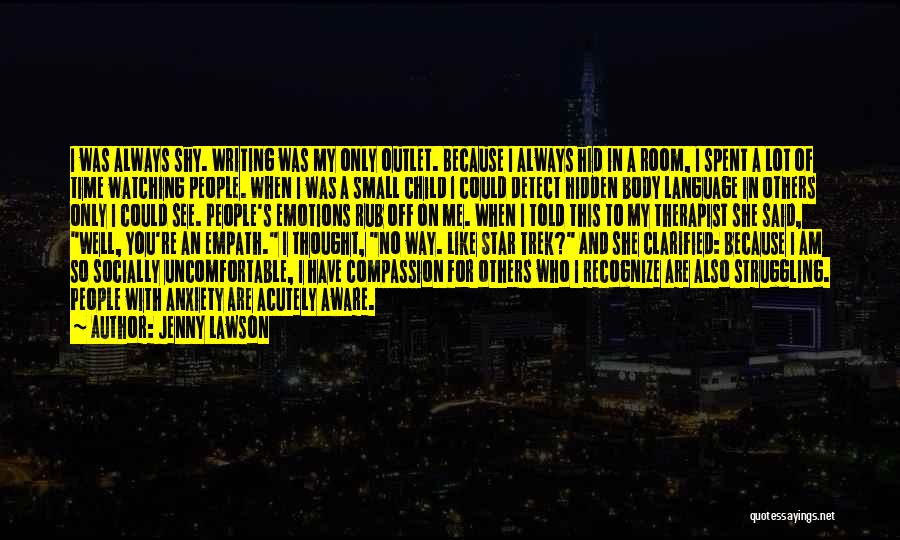
I was always shy. Writing was my only outlet. Because I always hid in a room, I spent a lot of time watching people. When I was a small child I could detect hidden body language in others only I could see. People's emotions rub off on me. When I told this to my therapist she said, "Well, you're an empath." I thought, "No way. Like Star Trek?" And she clarified: because I am so socially uncomfortable, I have compassion for others who I recognize are also struggling. People with anxiety are acutely aware. — Jenny Lawson
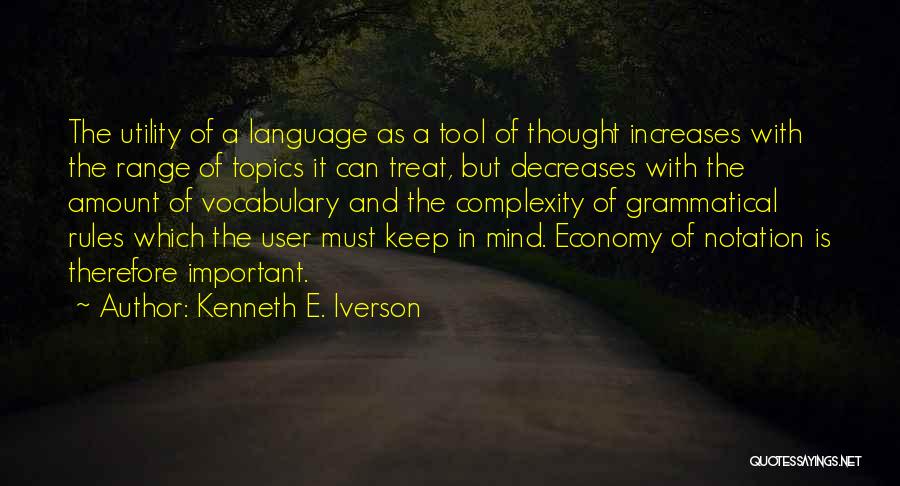
The utility of a language as a tool of thought increases with the range of topics it can treat, but decreases with the amount of vocabulary and the complexity of grammatical rules which the user must keep in mind. Economy of notation is therefore important. — Kenneth E. Iverson
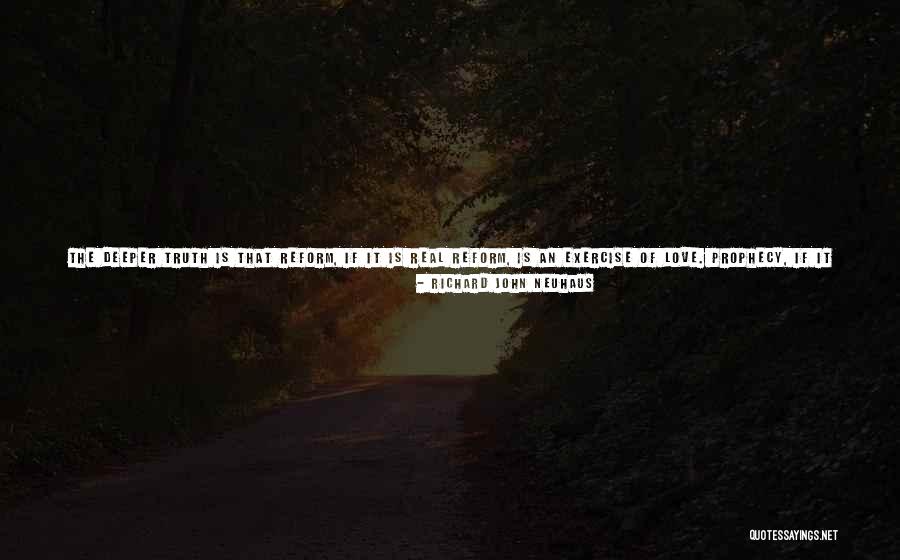
The deeper truth is that reform, if it is real reform, is an exercise of love. Prophecy, if it is real prophecy, is an exercise of love. Amos, Hosea, and Jeremiah employed such harsh language in criticizing the children of Israel precisely because they thought more of the people than the people thought of themselves. The prophets were in love with, were possessed by, a vision of the dignity and destiny of those they addressed. The outrageousness of sin and failure was in direct proportion to the greatness of God's intent for his people. Prophecy was always an exercise of love, never of contempt, for those to whom the prophet addressed his criticism. — Richard John Neuhaus
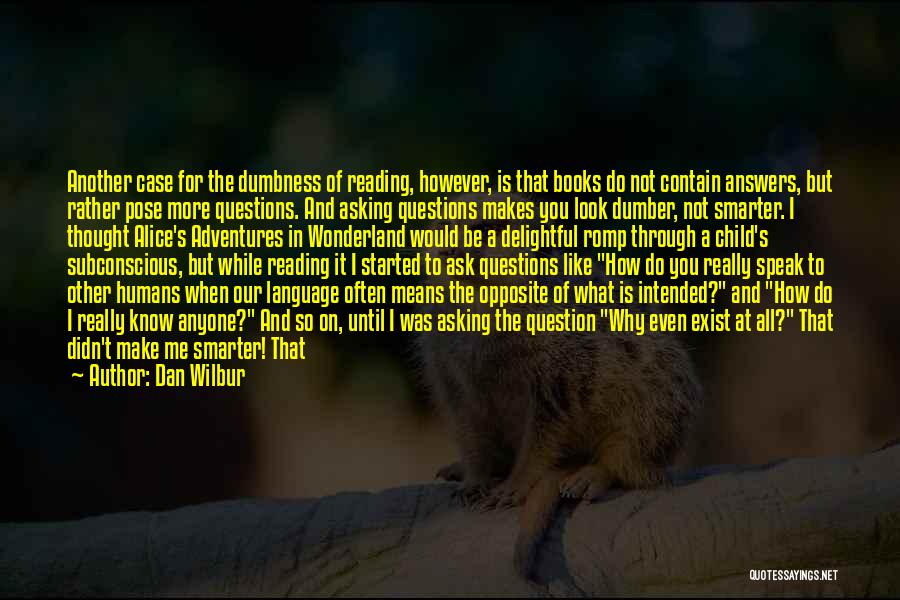
Another case for the dumbness of reading, however, is that books do not contain answers, but rather pose more questions. And asking questions makes you look dumber, not smarter.
I thought Alice's Adventures in Wonderland would be a delightful romp through a child's subconscious, but while reading it I started to ask questions like "How do you really speak to other humans when our language often means the opposite of what is intended?" and "How do I really know anyone?" And so on, until I was asking the question "Why even exist at all?"
That didn't make me smarter! That made me wish for death, and being dead looks way dumber than being alive. — Dan Wilbur
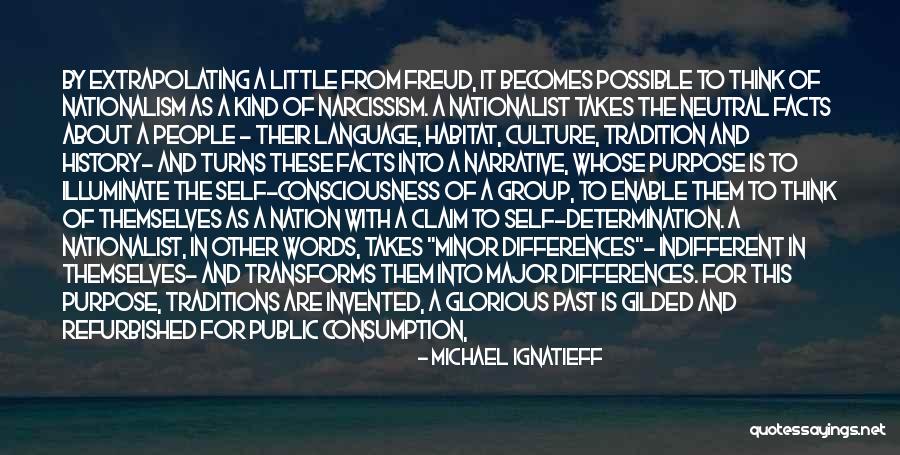
By extrapolating a little from Freud, it becomes possible to think of nationalism as a kind of narcissism. A nationalist takes the neutral facts about a people - their language, habitat, culture, tradition and history- and turns these facts into a narrative, whose purpose is to illuminate the self-consciousness of a group, to enable them to think of themselves as a nation with a claim to self-determination. A nationalist, in other words, takes "minor differences"- indifferent in themselves- and transforms them into major differences. For this purpose, traditions are invented, a glorious past is gilded and refurbished for public consumption, and a people who might not have thought of themselves as a people at all suddenly begin to dream of themselves as a nation. — Michael Ignatieff
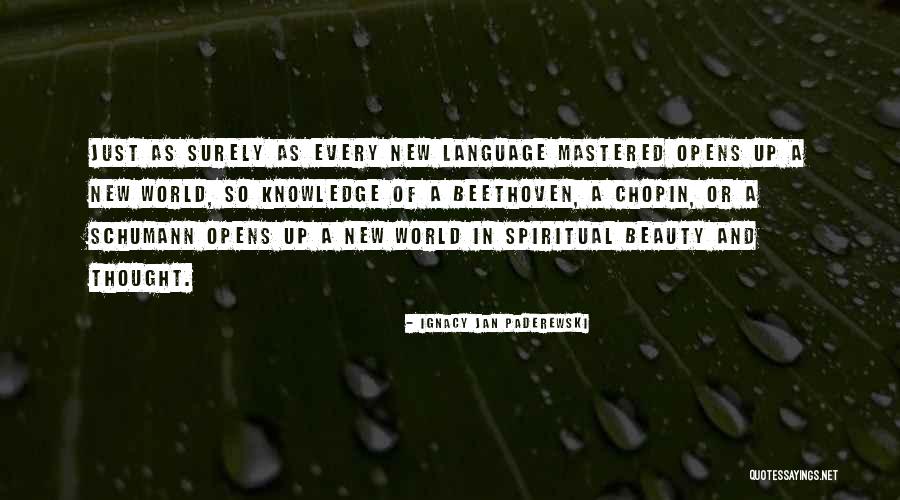
Just as surely as every new language mastered opens up a new world, so knowledge of a Beethoven, a Chopin, or a Schumann opens up a new world in spiritual beauty and thought. — Ignacy Jan Paderewski
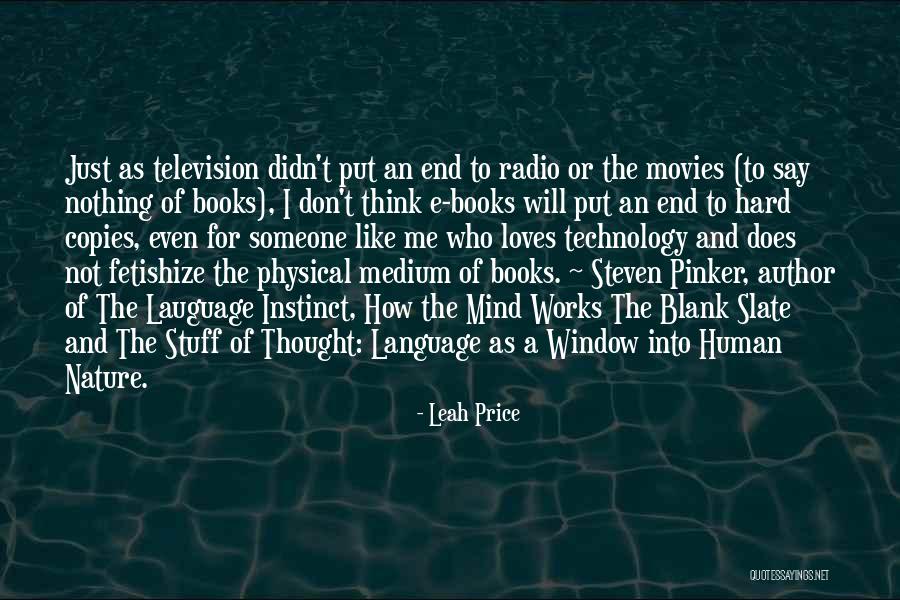
Just as television didn't put an end to radio or the movies (to say nothing of books), I don't think e-books will put an end to hard copies, even for someone like me who loves technology and does not fetishize the physical medium of books. ~ Steven Pinker, author of The Lauguage Instinct, How the Mind Works The Blank Slate and The Stuff of Thought: Language as a Window into Human Nature. — Leah Price

One day you're cut off, at the very start you're cut off and can't go back, the language you learn and the whole business of walking and all the rest is for the sake of the single thought, how to get back again. — Thomas Bernhard
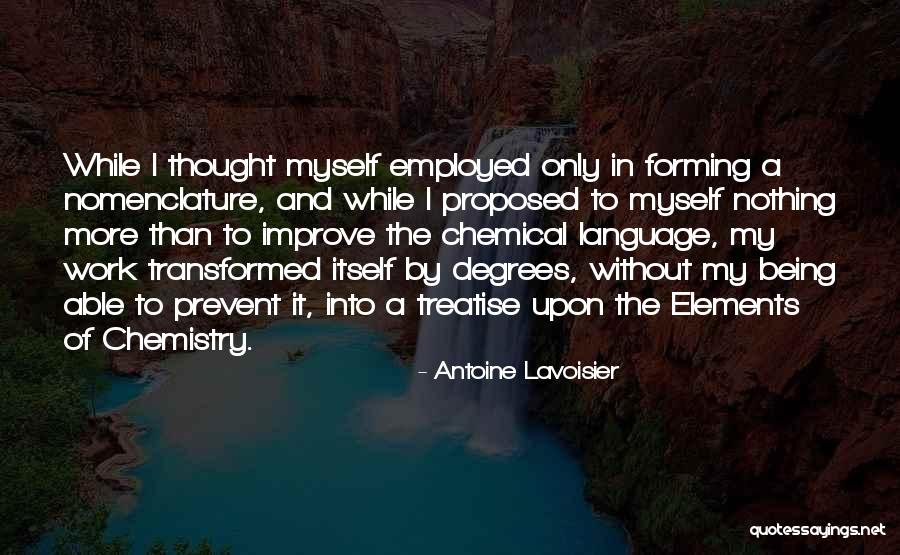
While I thought myself employed only in forming a nomenclature, and while I proposed to myself nothing more than to improve the chemical language, my work transformed itself by degrees, without my being able to prevent it, into a treatise upon the Elements of Chemistry. — Antoine Lavoisier
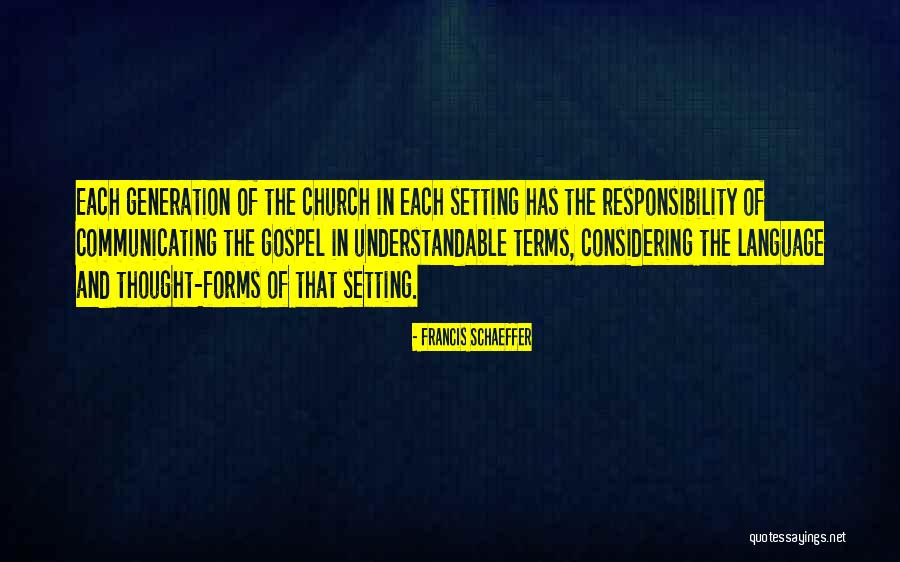
Each generation of the church in each setting has the responsibility of communicating the gospel in understandable terms, considering the language and thought-forms of that setting. — Francis Schaeffer
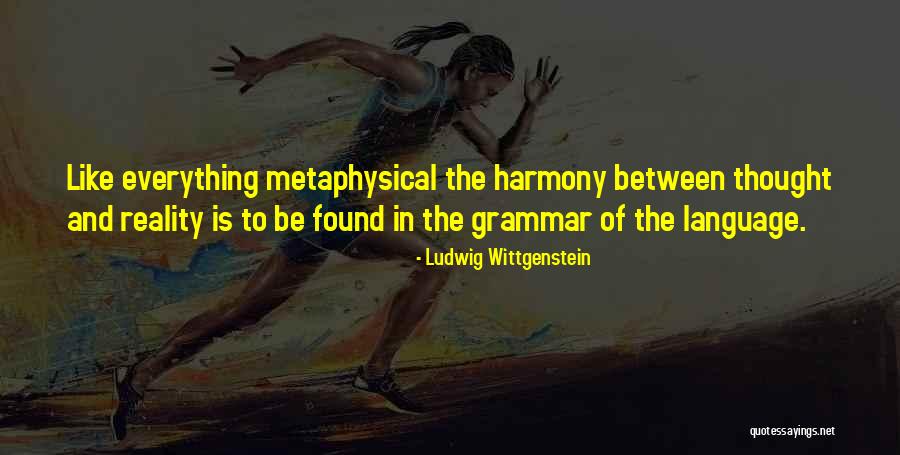
Like everything metaphysical the harmony between thought and reality is to be found in the grammar of the language. — Ludwig Wittgenstein
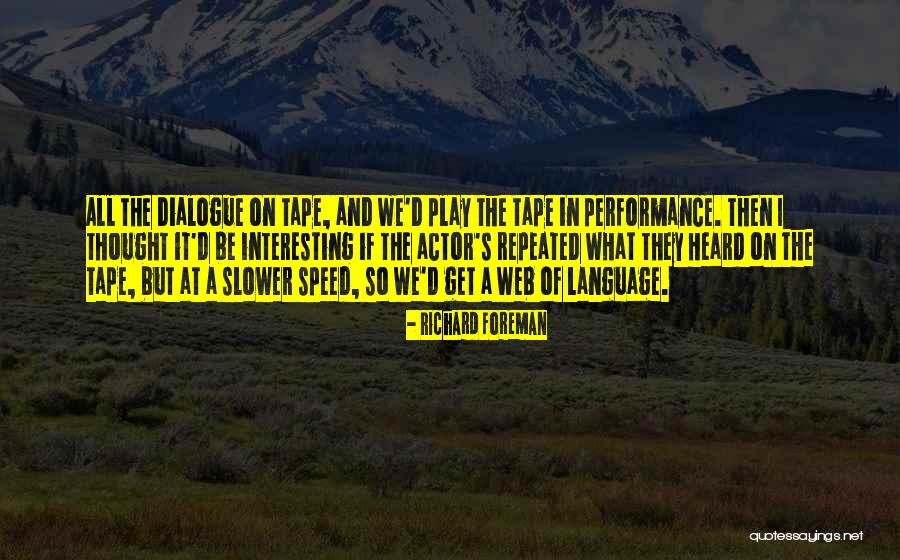
All the dialogue on tape, and we'd play the tape in performance. Then I thought it'd be interesting if the actor's repeated what they heard on the tape, but at a slower speed, so we'd get a web of language. — Richard Foreman
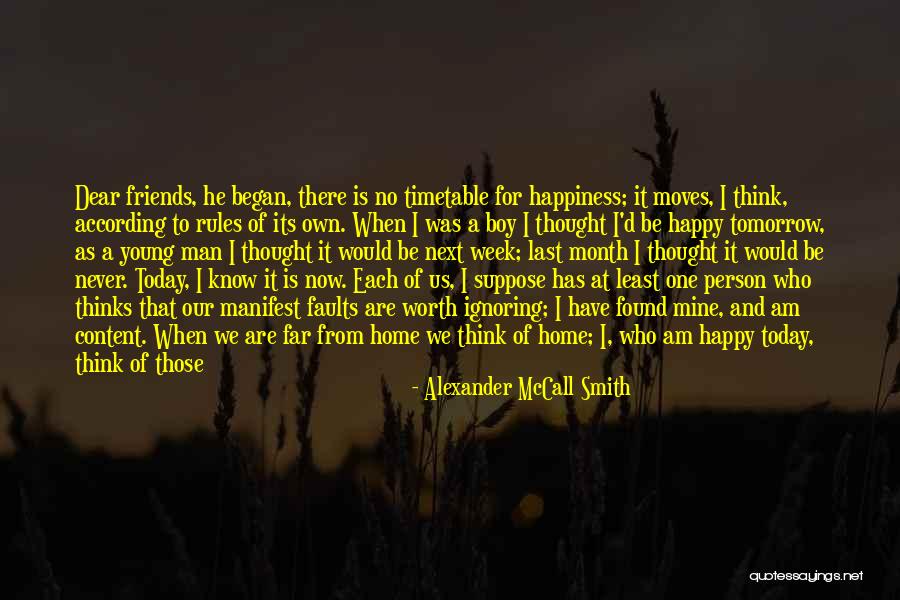
Dear friends, he began, there is no timetable for happiness; it moves, I think, according to rules of its own. When I was a boy I thought I'd be happy tomorrow, as a young man I thought it would be next week; last month I thought it would be never. Today, I know it is now. Each of us, I suppose has at least one person who thinks that our manifest faults are worth ignoring; I have found mine, and am content. When we are far from home we think of home; I, who am happy today, think of those in Scotland for whom such happiness might seem elusive; may such powers as listen to what is said by people like me, in olive groves like this, grant to those who want a friendship a friend, attend to the needs of those who have little, hold the hand of those who are lonely, allow Scotland, our place, our country, to sing in the language of her choosing that song she has always wanted to sing, which is of brotherhood, which is of love. — Alexander McCall Smith
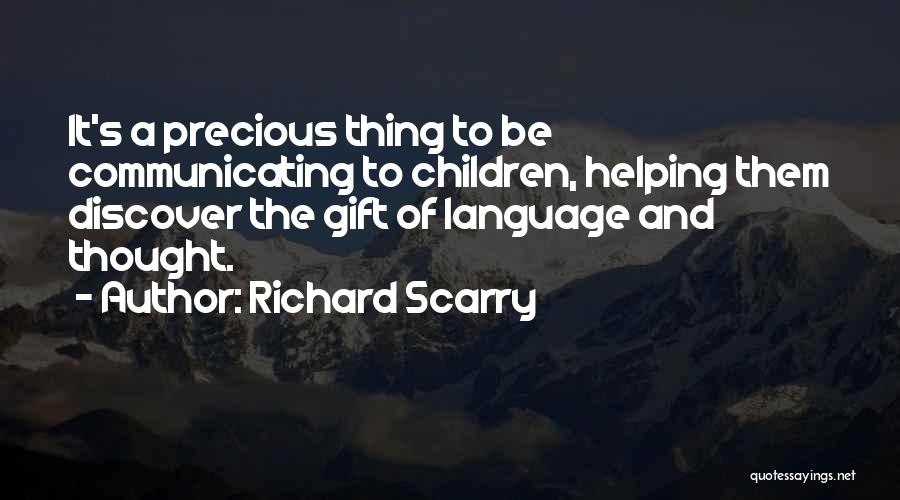
It's a precious thing to be communicating to children, helping them discover the gift of language and thought. — Richard Scarry

Love, she thought, he'd typed "love" just as she had. A multifacedted word, love, there probably wasn't another word in this or any other language that had so many shades and degrees. She knew that he loved her and she loved him, just as she loved Adam and Adam loved her. But with love, theirs or his, it was always a question of degree, and what one was willing to do to express that degree. — Daniel Waters
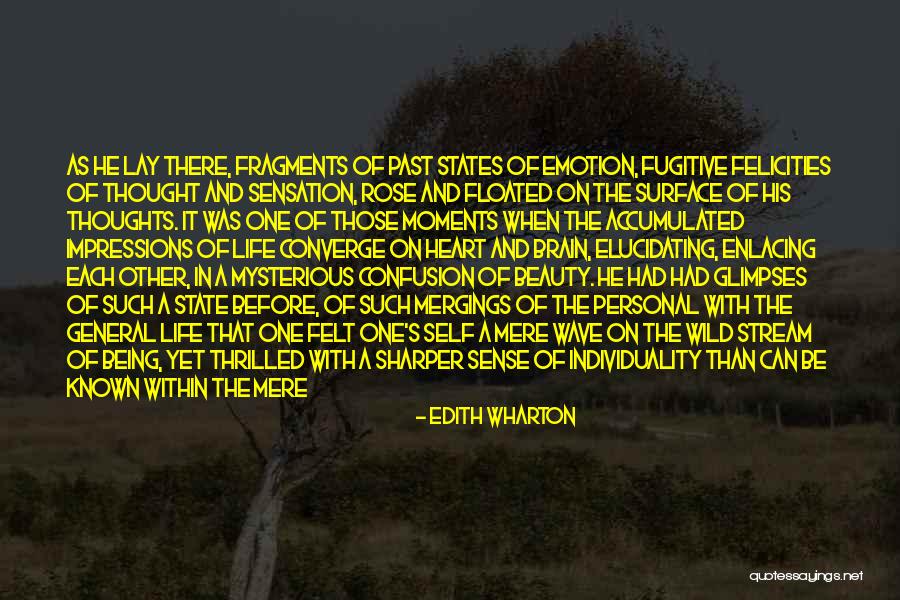
As he lay there, fragments of past states of emotion, fugitive felicities of thought and sensation, rose and floated on the surface of his thoughts. It was one of those moments when the accumulated impressions of life converge on heart and brain, elucidating, enlacing each other, in a mysterious confusion of beauty. He had had glimpses of such a state before, of such mergings of the personal with the general life that one felt one's self a mere wave on the wild stream of being, yet thrilled with a sharper sense of individuality than can be known within the mere bounds of the actual. But now he knew the sensation in its fulness, and with it came the releasing power of language. Words were flashing like brilliant birds through the boughs overhead; he had but to wave his magic wand to have them flutter down to him. Only they were so beautiful up there, weaving their fantastic flights against the blue, that it was pleasanter, for the moment, to watch them and let the wand lie. — Edith Wharton

Thought and language are to the artist instruments of an art. Vice and virtue are to the artist materials for an art. — Oscar Wilde
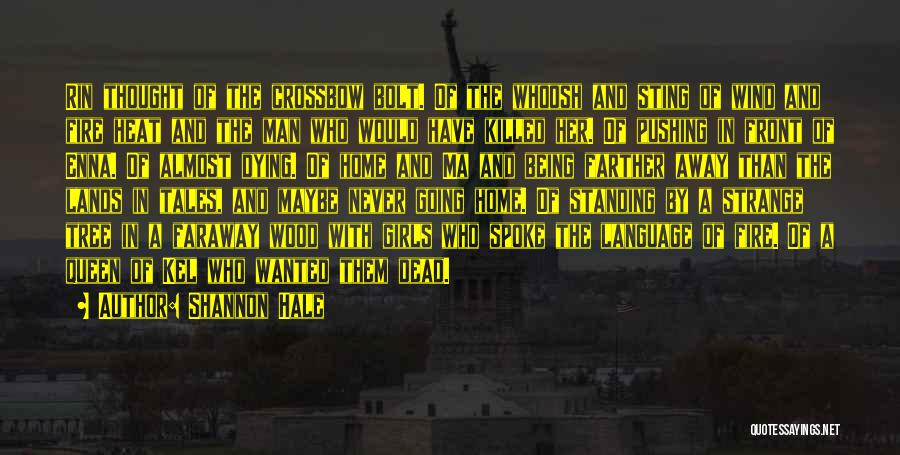
Rin thought of the crossbow bolt. Of the whoosh and sting of wind and fire heat and the man who would have killed her. Of pushing in front of Enna. Of almost dying. Of home and Ma and being farther away than the lands in tales, and maybe never going home. Of standing by a strange tree in a faraway wood with girls who spoke the language of fire. Of a queen of Kel who wanted them dead. — Shannon Hale
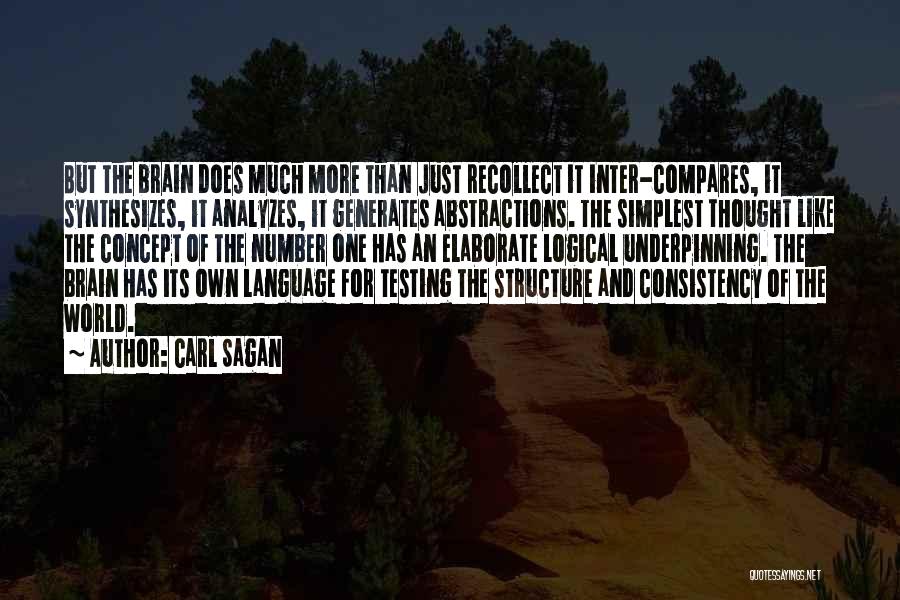
But the brain does much more than just recollect it inter-compares, it synthesizes, it analyzes, it generates abstractions. The simplest thought like the concept of the number one has an elaborate logical underpinning. The brain has its own language for testing the structure and consistency of the world. — Carl Sagan
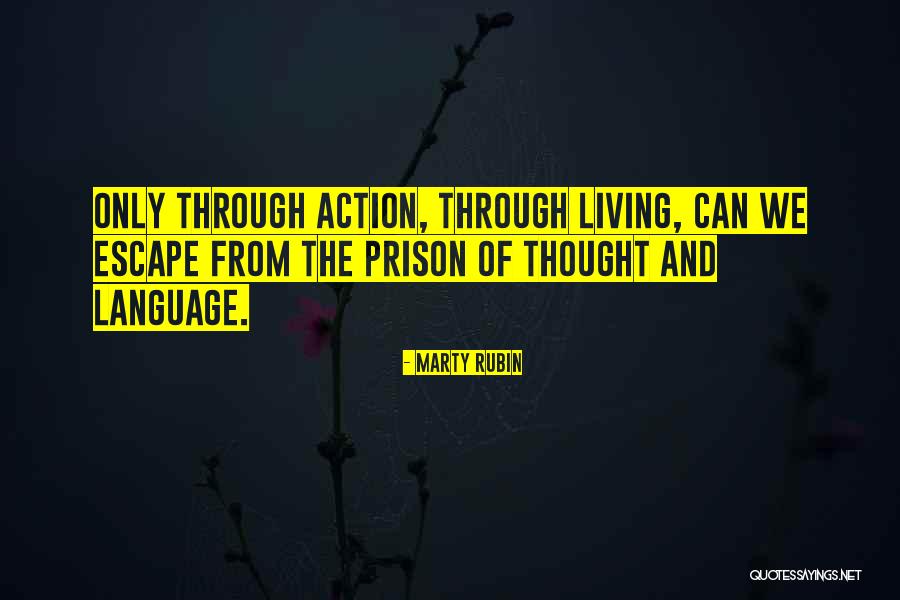
Only through action, through living, can we escape from the prison of thought and language. — Marty Rubin
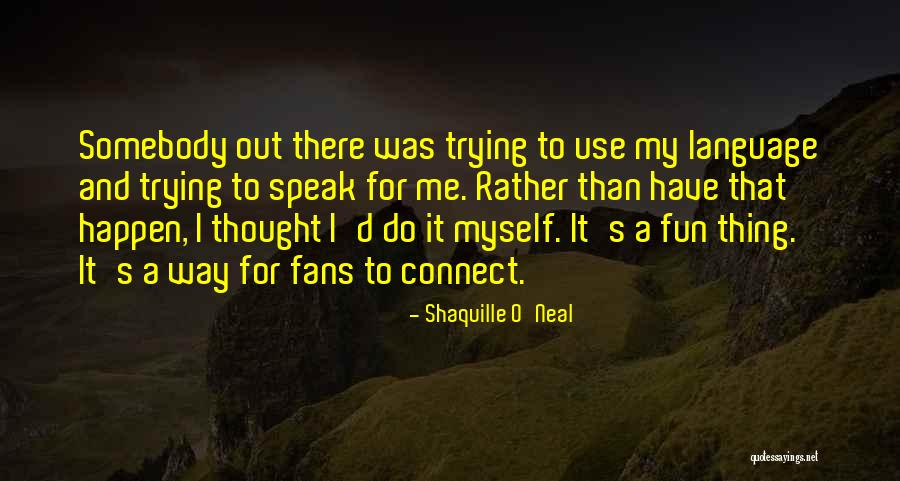
Somebody out there was trying to use my language and trying to speak for me. Rather than have that happen, I thought I'd do it myself. It's a fun thing. It's a way for fans to connect. — Shaquille O'Neal

Fiona had never learned her mother's language and she had never shown much respect for the stories that it preserved-the stories that Grant had taught and written about, and still did write about, in his working life. She referred to their heroes as "old Njal" or "old Snorri." But in the last few years she had developed an interest in the country itself and looked at travel guides. She read about William Morris's trip, and Auden's. She didn't really plan to travel there. She said the weather was too dreadful. Also-she said-there ought to be one place you thought about and knew about and maybe longed for-but never did get to see. — Alice Munro
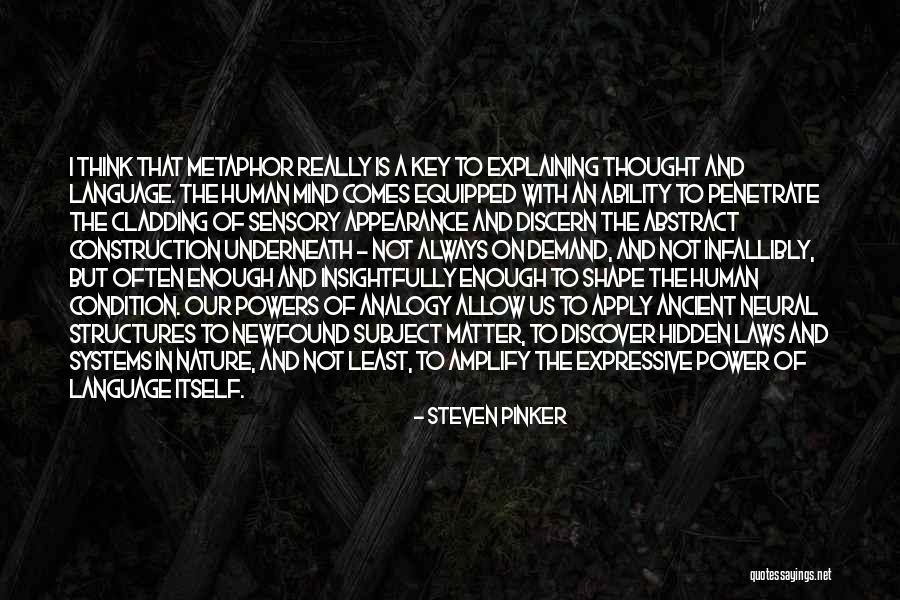
I think that metaphor really is a key to explaining thought and language. The human mind comes equipped with an ability to penetrate the cladding of sensory appearance and discern the abstract construction underneath - not always on demand, and not infallibly, but often enough and insightfully enough to shape the human condition. Our powers of analogy allow us to apply ancient neural structures to newfound subject matter, to discover hidden laws and systems in nature, and not least, to amplify the expressive power of language itself. — Steven Pinker
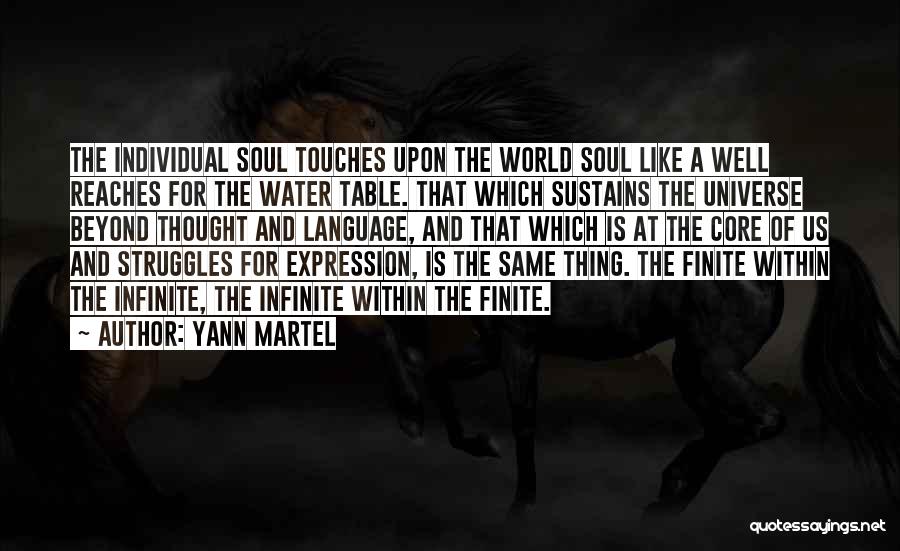
The individual soul touches upon the world soul like a well reaches for the water table. That which sustains the universe beyond thought and language, and that which is at the core of us and struggles for expression, is the same thing. The finite within the infinite, the infinite within the finite. — Yann Martel
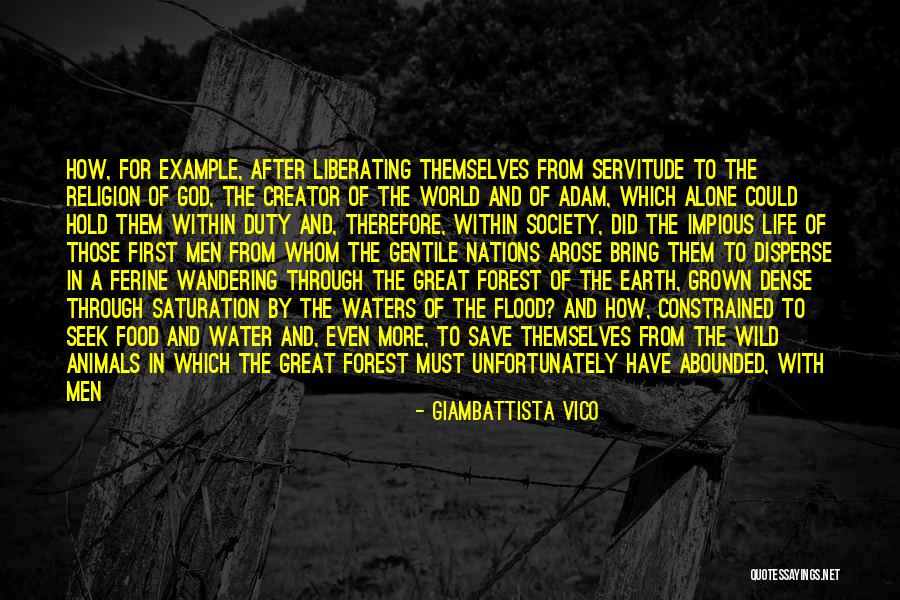
How, for example, after liberating themselves from servitude to the religion of God, the creator of the world and of Adam, which alone could hold them within duty and, therefore, within society, did the impious life of those first men from whom the gentile nations arose bring them to disperse in a ferine wandering through the great forest of the earth, grown dense through saturation by the waters of the Flood? And how, constrained to seek food and water and, even more, to save themselves from the wild animals in which the great forest must unfortunately have abounded, with men frequently abandoning their women and mothers their children, and with no way of reuniting, did their descendants gradually come to forget the language of Adam and, without language or any thought other than that of satisfying their hunger, thirst and the foment of their lust, deaden all sense of humanity? — Giambattista Vico
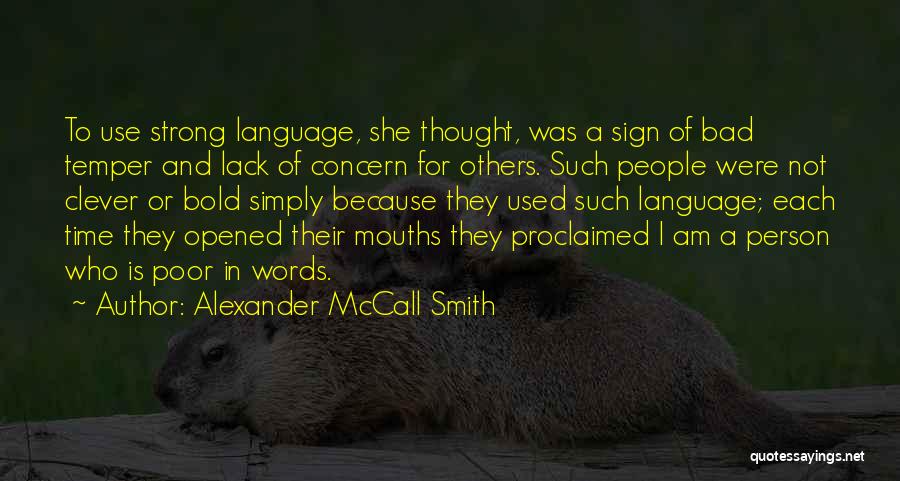
To use strong language, she thought, was a sign of bad temper and lack of concern for others. Such people were not clever or bold simply because they used such language; each time they opened their mouths they proclaimed I am a person who is poor in words. — Alexander McCall Smith
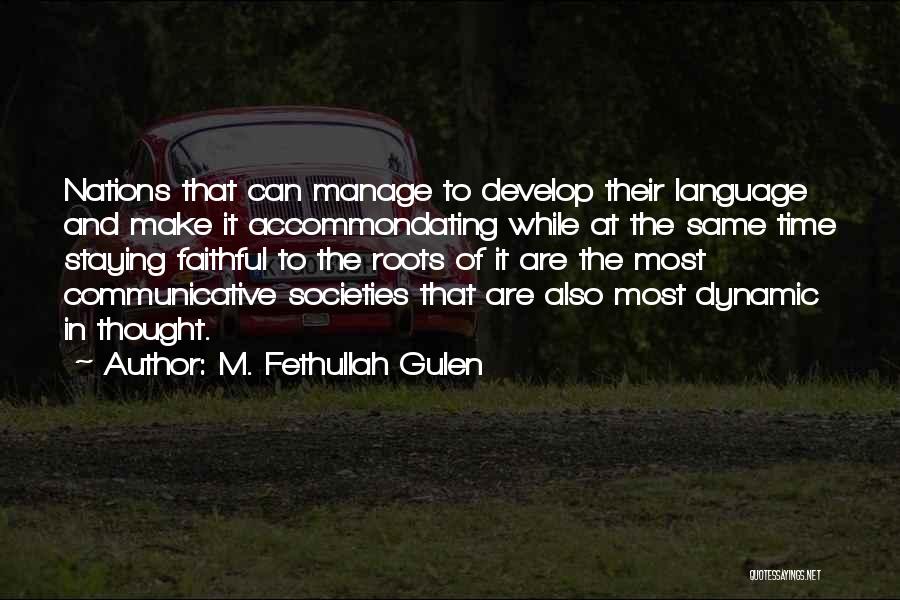
Nations that can manage to develop their language and make it accommondating while at the same time staying faithful to the roots of it are the most communicative societies that are also most dynamic in thought. — M. Fethullah Gulen
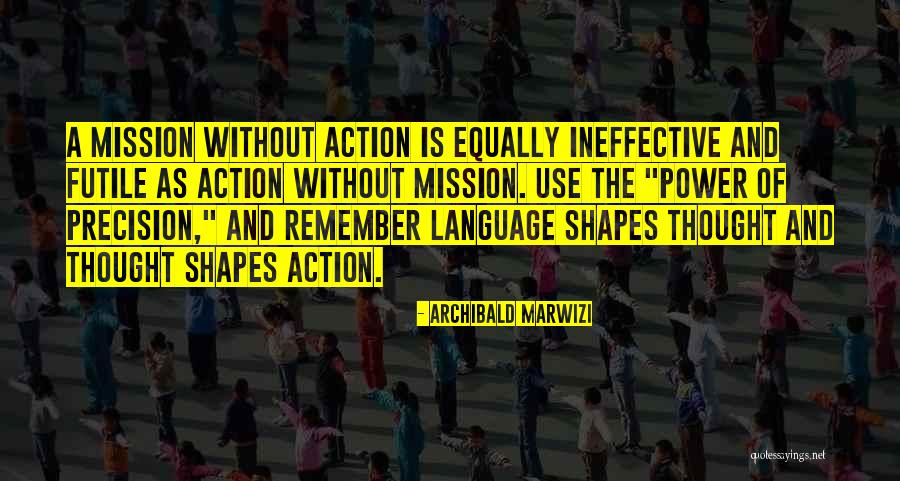
A mission without action is equally ineffective and futile as action without mission. Use the "power of precision," and remember language shapes thought and thought shapes action. — Archibald Marwizi
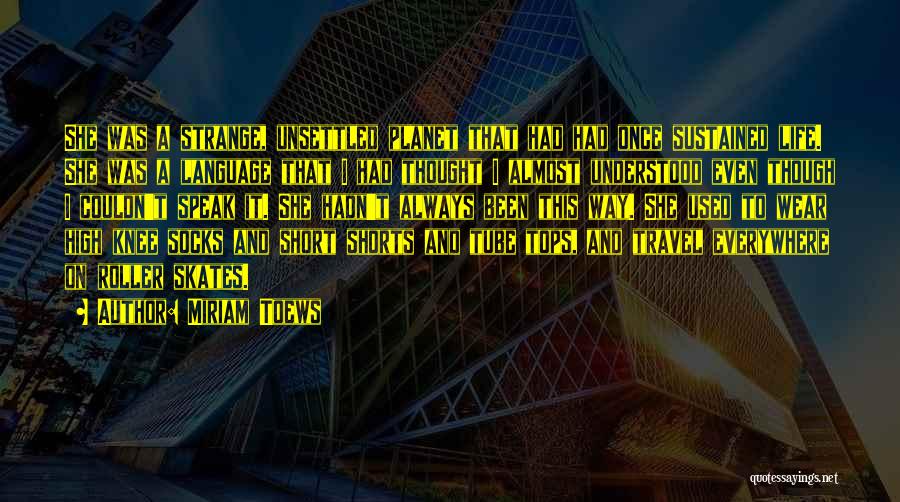
She was a strange, unsettled planet that had had once sustained life. She was a language that I had thought I almost understood even though I couldn't speak it. She hadn't always been this way. She used to wear high knee socks and short shorts and tube tops, and travel everywhere on roller skates. — Miriam Toews
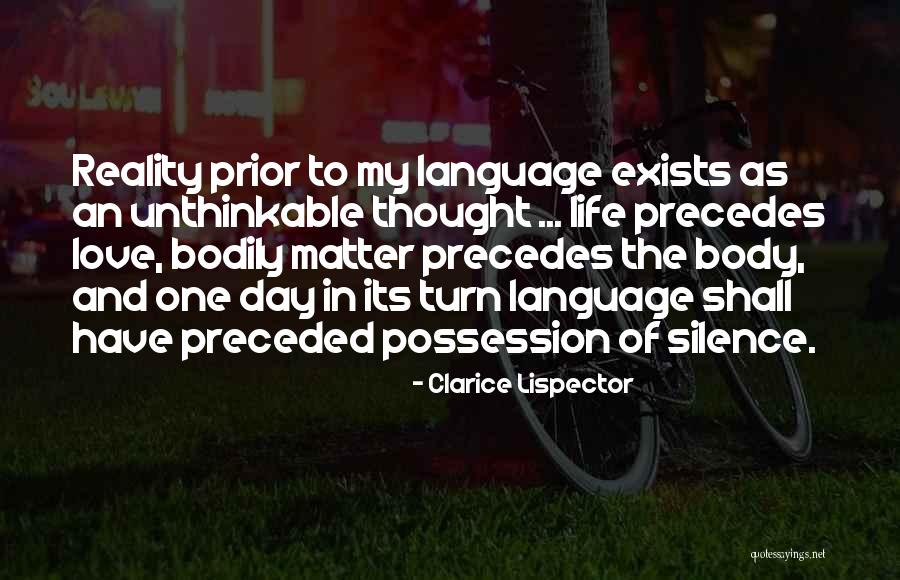
Reality prior to my language exists as an unthinkable thought ... life precedes love, bodily matter precedes the body, and one day in its turn language shall have preceded possession of silence. — Clarice Lispector
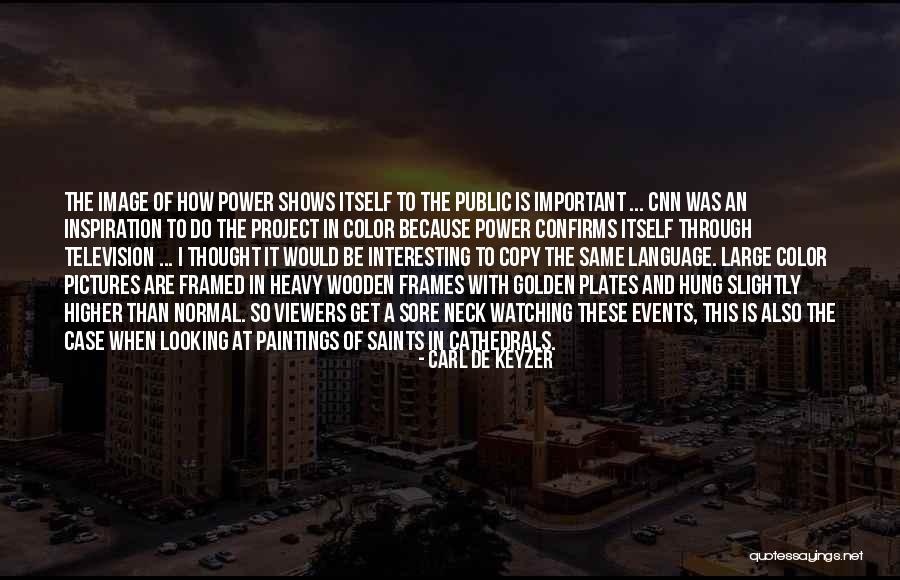
The image of how power shows itself to the public is important ... CNN was an inspiration to do the project in color because power confirms itself through television ... I thought it would be interesting to copy the same language. large color pictures are framed in heavy wooden frames with golden plates and hung slightly higher than normal. So viewers get a sore neck watching these events, this is also the case when looking at paintings of saints in cathedrals. — Carl De Keyzer
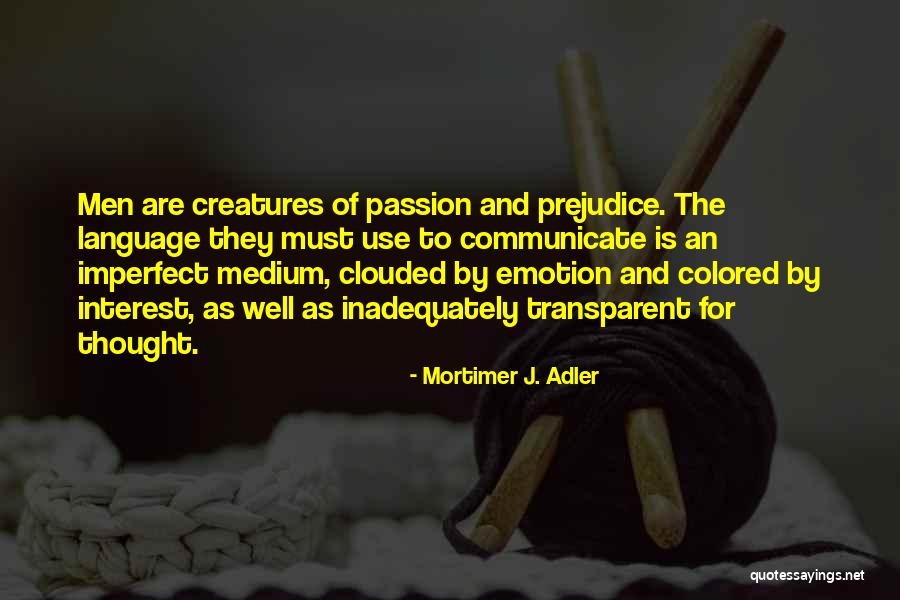
Men are creatures of passion and prejudice. The language they must use to communicate is an imperfect medium, clouded by emotion and colored by interest, as well as inadequately transparent for thought. — Mortimer J. Adler
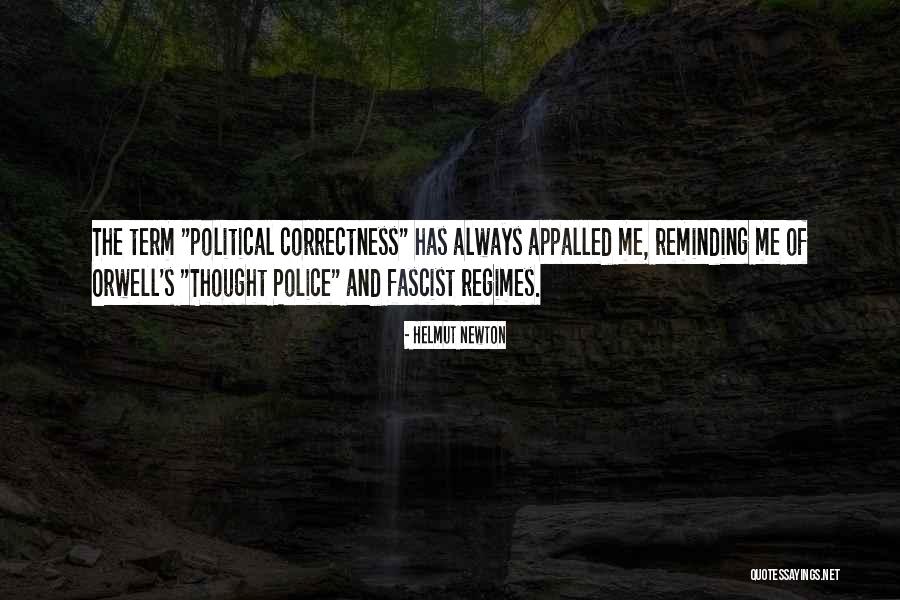
The term "political correctness" has always appalled me, reminding me of Orwell's "Thought Police" and fascist regimes. — Helmut Newton
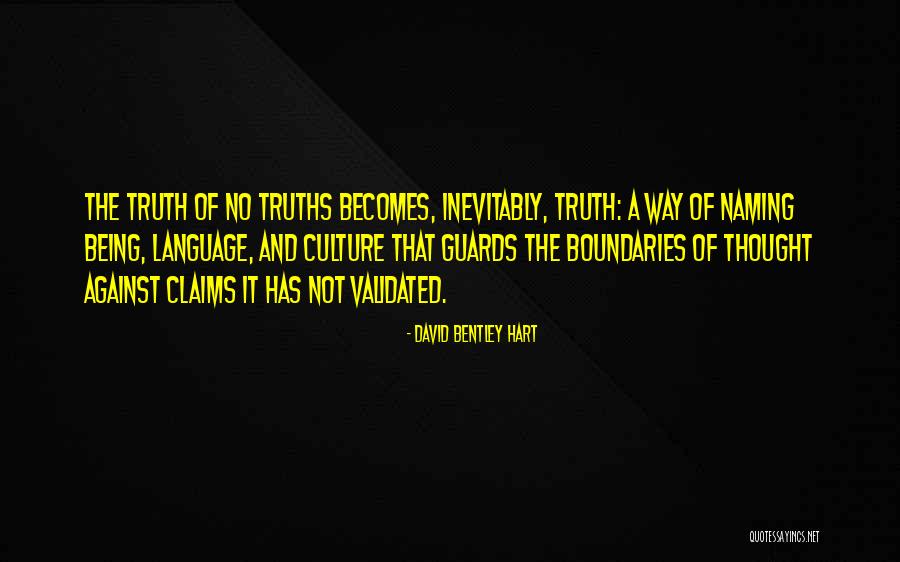
The truth of no truths becomes, inevitably, truth: a way of naming being, language, and culture that guards the boundaries of thought against claims it has not validated. — David Bentley Hart
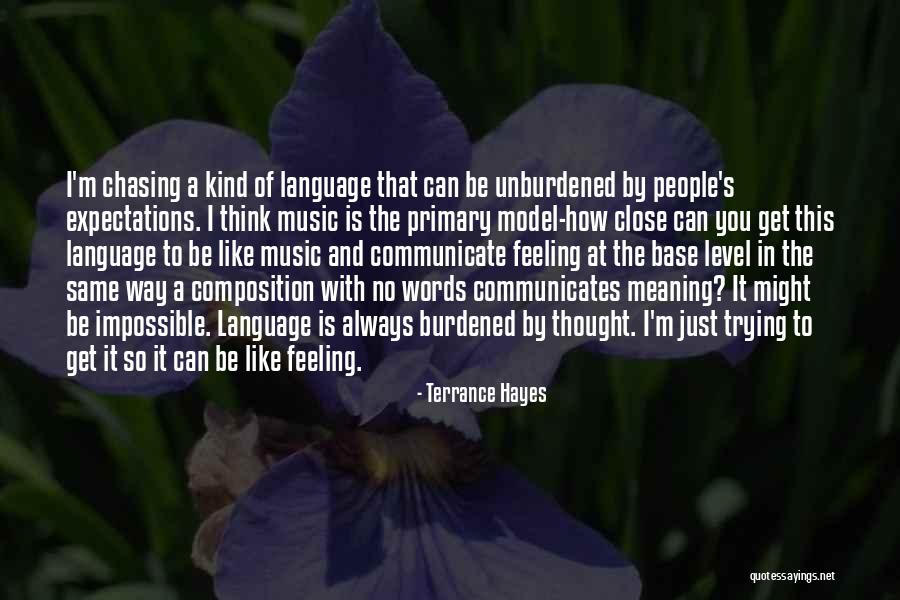
I'm chasing a kind of language that can be unburdened by people's expectations. I think music is the primary model-how close can you get this language to be like music and communicate feeling at the base level in the same way a composition with no words communicates meaning? It might be impossible. Language is always burdened by thought. I'm just trying to get it so it can be like feeling. — Terrance Hayes
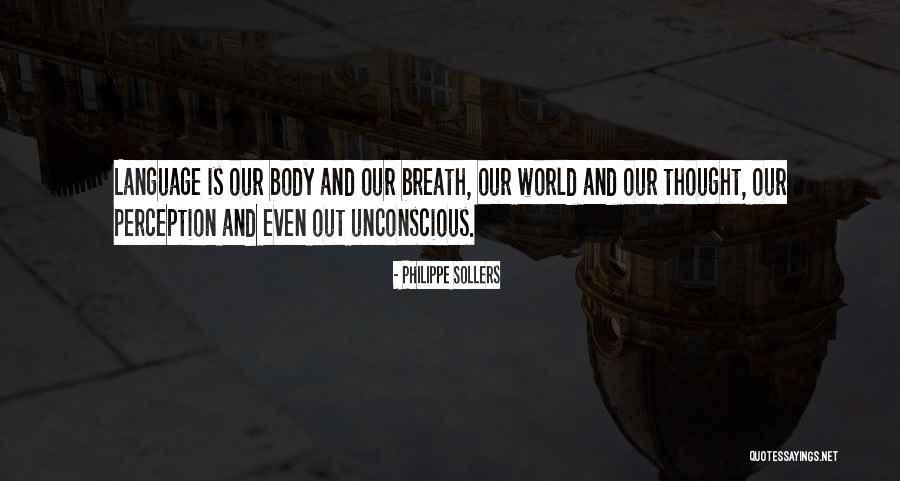
Language is our body and our breath, our world and our thought, our perception and even out unconscious. — Philippe Sollers
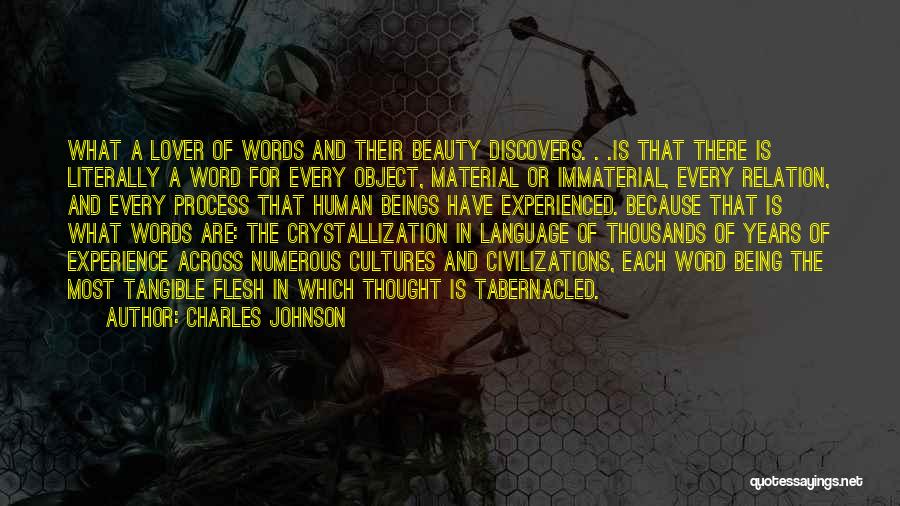
What a lover of words and their beauty discovers. . .is that there is literally a word for every object, material or immaterial, every relation, and every process that human beings have experienced. Because that is what words are: the crystallization in language of thousands of years of experience across numerous cultures and civilizations, each word being the most tangible flesh in which thought is tabernacled. — Charles Johnson
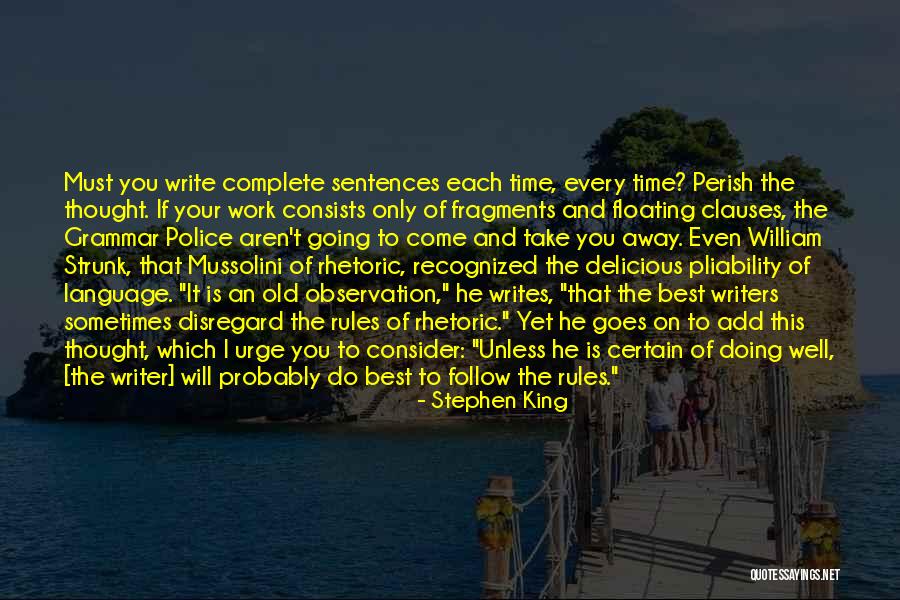
Must you write complete sentences each time, every time? Perish the thought. If your work consists only of fragments and floating clauses, the Grammar Police aren't going to come and take you away. Even William Strunk, that Mussolini of rhetoric, recognized the delicious pliability of language. "It is an old observation," he writes, "that the best writers sometimes disregard the rules of rhetoric." Yet he goes on to add this thought, which I urge you to consider: "Unless he is certain of doing well, [the writer] will probably do best to follow the rules." — Stephen King
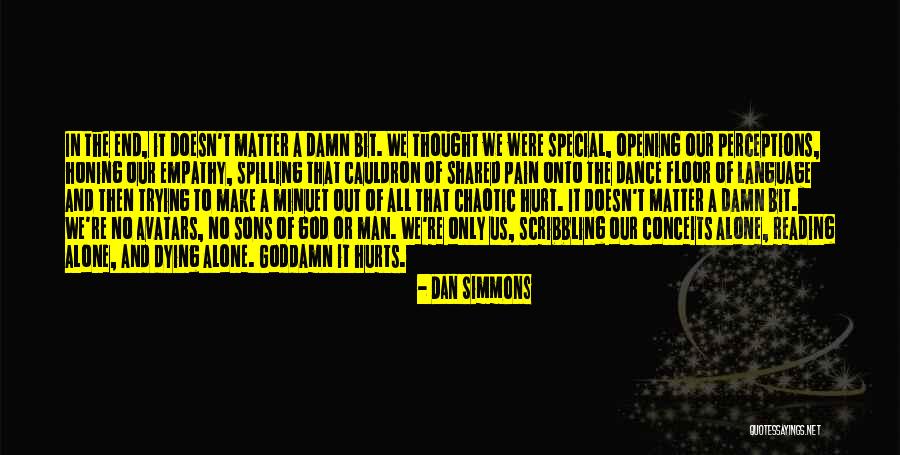
In the end, it doesn't matter a damn bit. We thought we were special, opening our perceptions, honing our empathy, spilling that cauldron of shared pain onto the dance floor of language and then trying to make a minuet out of all that chaotic hurt. It doesn't matter a damn bit. We're no avatars, no sons of god or man. We're only us, scribbling our conceits alone, reading alone, and dying alone. Goddamn it hurts. — Dan Simmons
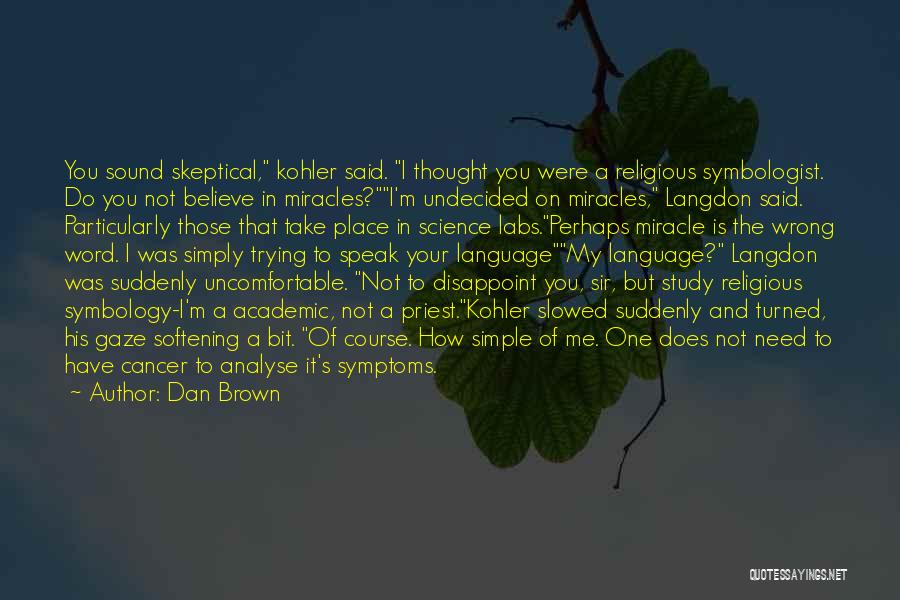
You sound skeptical," kohler said. "I thought you were a religious symbologist. Do you not believe in miracles?"
"I'm undecided on miracles," Langdon said. Particularly those that take place in science labs.
"Perhaps miracle is the wrong word. I was simply trying to speak your language"
"My language?" Langdon was suddenly uncomfortable. "Not to disappoint you, sir, but study religious symbology-I'm a academic, not a priest."
Kohler slowed suddenly and turned, his gaze softening a bit. "Of course. How simple of me. One does not need to have cancer to analyse it's symptoms. — Dan Brown
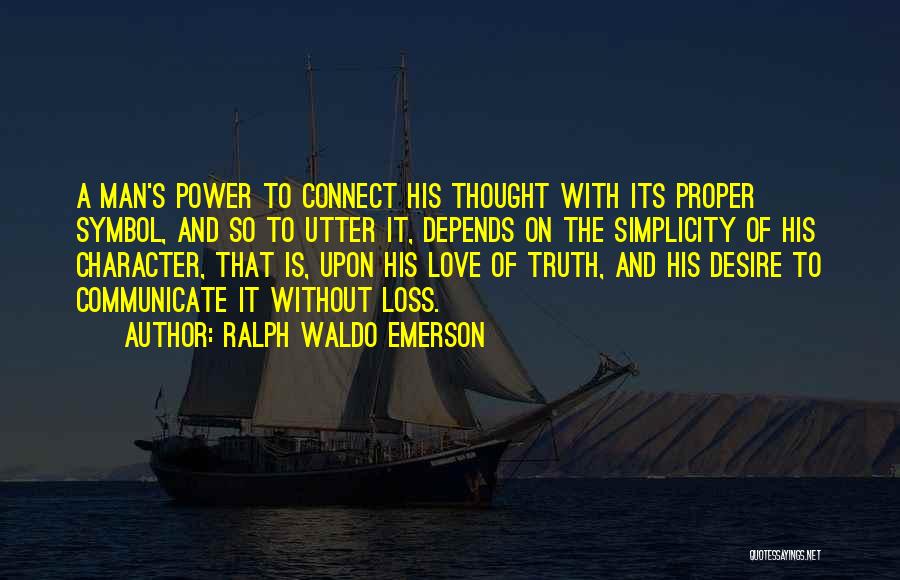
A man's power to connect his thought with its proper symbol, and so to utter it, depends on the simplicity of his character, that is, upon his love of truth, and his desire to communicate it without loss. — Ralph Waldo Emerson
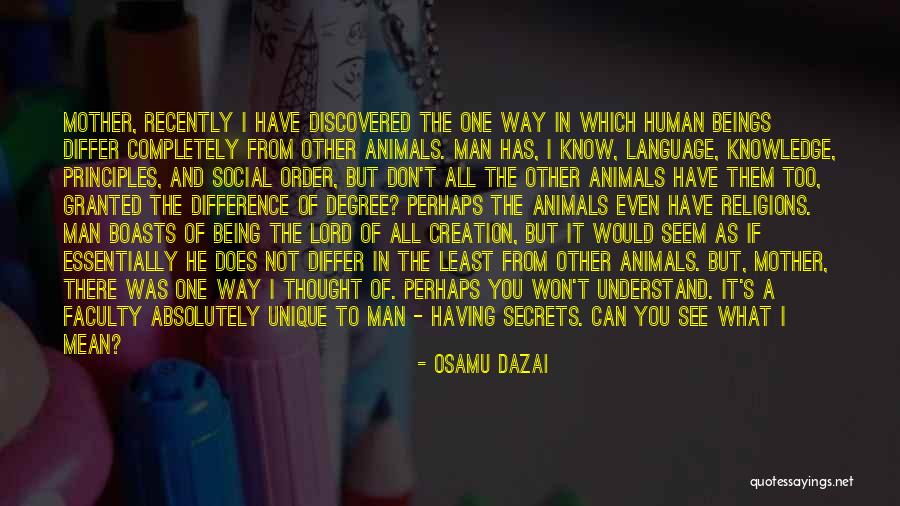
Mother, recently I have discovered the one way in which human beings differ completely from other animals. Man has, I know, language, knowledge, principles, and social order, but don't all the other animals have them too, granted the difference of degree? Perhaps the animals even have religions. Man boasts of being the lord of all creation, but it would seem as if essentially he does not differ in the least from other animals. But, Mother, there was one way I thought of. Perhaps you won't understand. It's a faculty absolutely unique to man - having secrets. Can you see what I mean? — Osamu Dazai

The Old Language really was beautiful, Blay thought. Staring at the symbols, for one brief, ridiculous moment he imagined his own name across Qhuinn's shoulders, carved into that smooth skin in the manner of the mating ritual.
Never going to happen. They were destined to be best friends ... which, compared to strangers, was something huge. Compared to lovers? It was the cold side of a locked door. — J.R. Ward
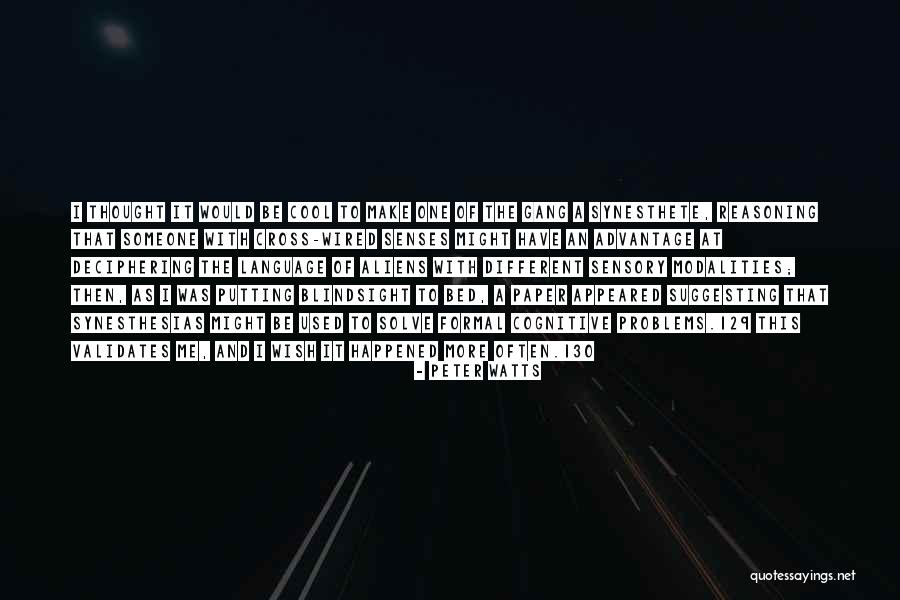
I thought it would be cool to make one of the Gang a synesthete, reasoning that someone with cross-wired senses might have an advantage at deciphering the language of aliens with different sensory modalities; then, as I was putting Blindsight to bed, a paper appeared suggesting that synesthesias might be used to solve formal cognitive problems.129 This validates me, and I wish it happened more often.130 — Peter Watts
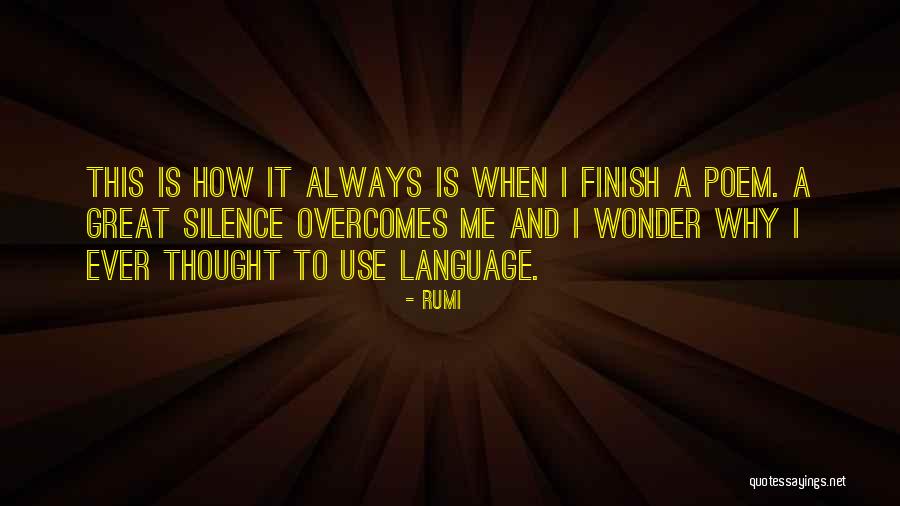
This is how it always is when I finish a poem. A great silence overcomes me and I wonder why I ever thought to use language. — Rumi
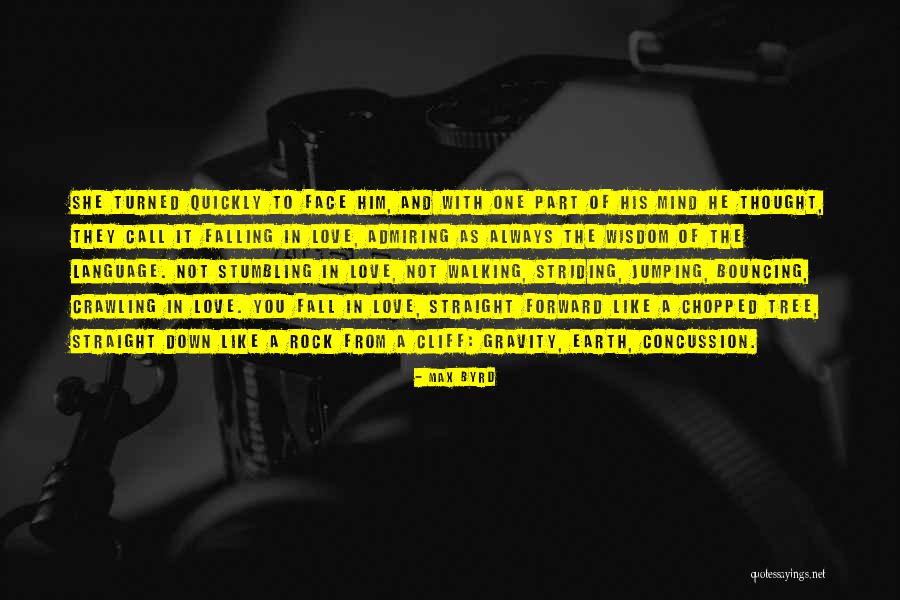
She turned quickly to face him, and with one part of his mind he thought, They call it falling in love, admiring as always the wisdom of the language. Not stumbling in love, not walking, striding, jumping, bouncing, crawling in love. You fall in love, straight forward like a chopped tree, straight down like a rock from a cliff: gravity, earth, concussion. — Max Byrd
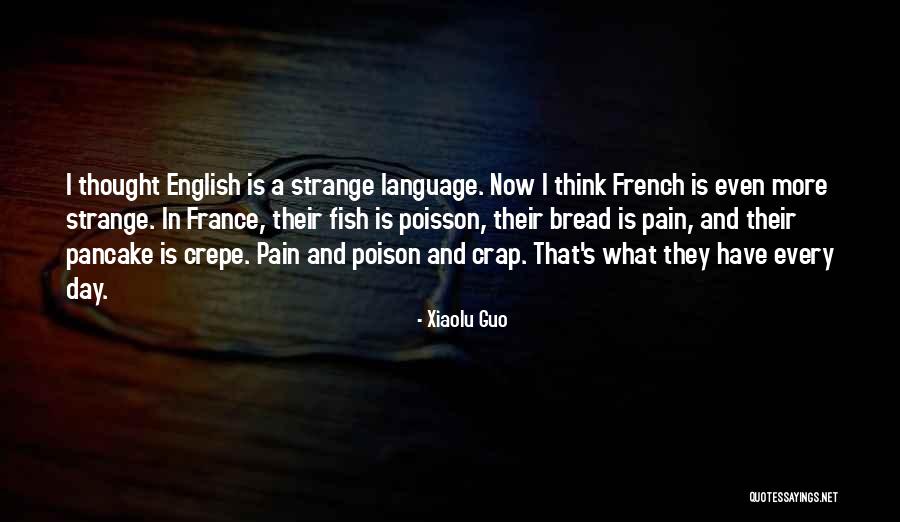
I thought English is a strange language. Now I think French is even more strange. In France, their fish is poisson, their bread is pain, and their pancake is crepe. Pain and poison and crap. That's what they have every day. — Xiaolu Guo
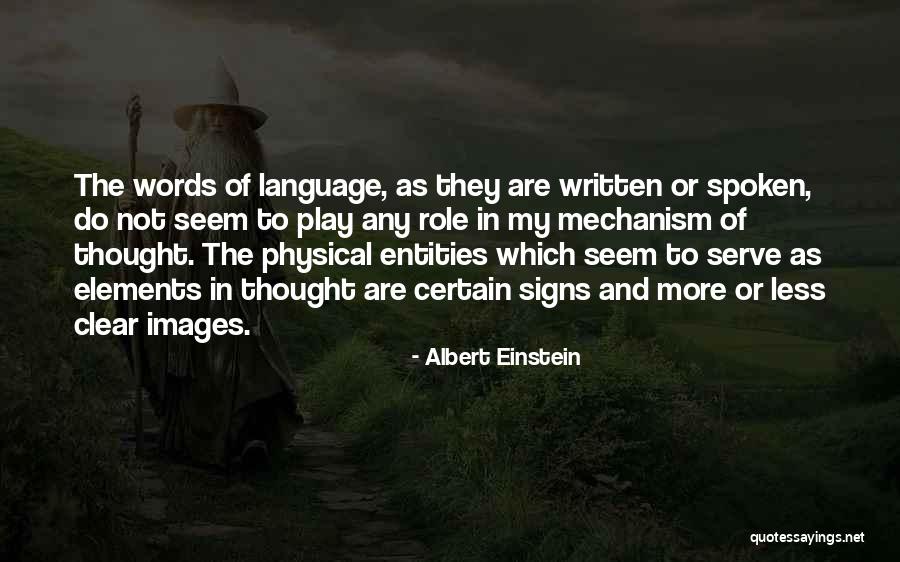
The words of language, as they are written or spoken, do not seem to play any role in my mechanism of thought. The physical entities which seem to serve as elements in thought are certain signs and more or less clear images. — Albert Einstein
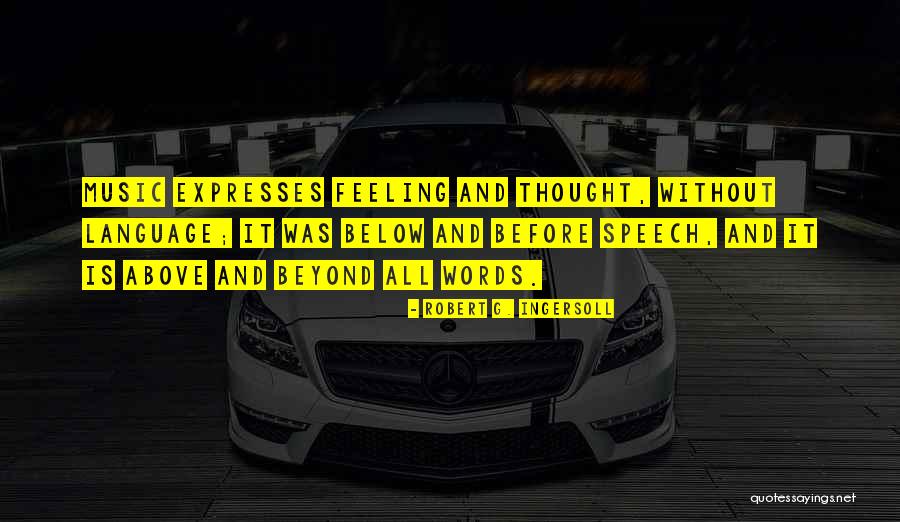
Music expresses feeling and thought, without language; it was below and before speech, and it is above and beyond all words. — Robert G. Ingersoll
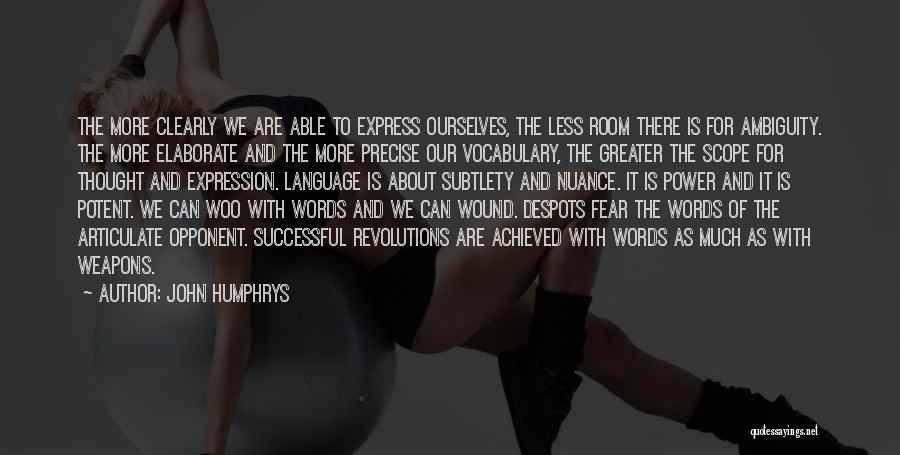
The more clearly we are able to express ourselves, the less room there is for ambiguity. The more elaborate and the more precise our vocabulary, the greater the scope for thought and expression. Language is about subtlety and nuance. It is power and it is potent. We can woo with words and we can wound. Despots fear the words of the articulate opponent. Successful revolutions are achieved with words as much as with weapons. — John Humphrys
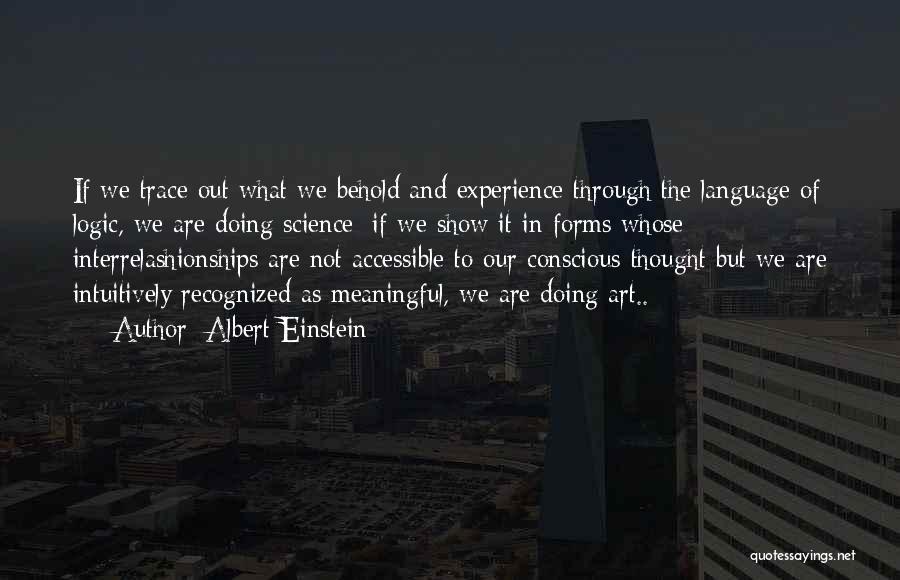
If we trace out what we behold and experience through the language of logic, we are doing science; if we show it in forms whose interrelashionships are not accessible to our conscious thought but we are intuitively recognized as meaningful, we are doing art.. — Albert Einstein
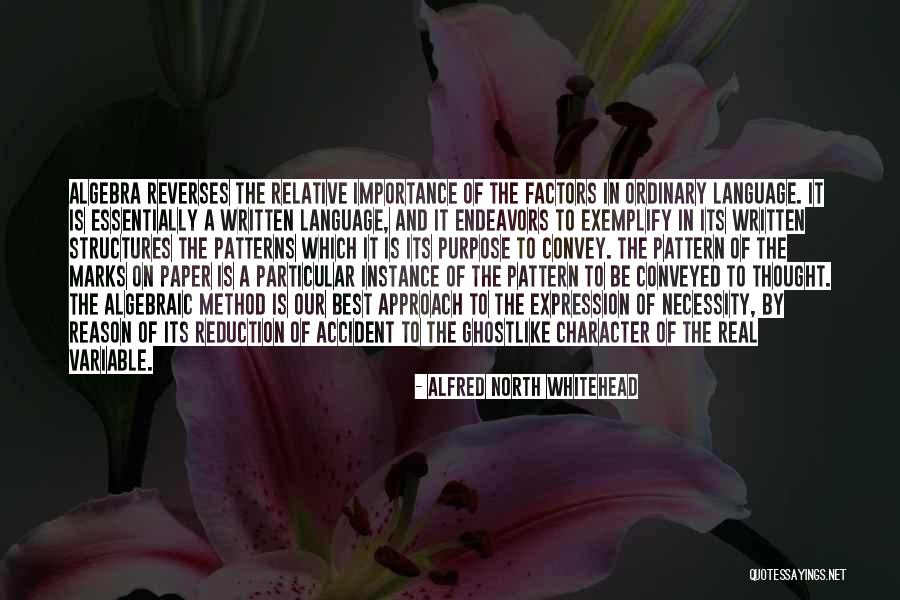
Algebra reverses the relative importance of the factors in ordinary language. It is essentially a written language, and it endeavors to exemplify in its written structures the patterns which it is its purpose to convey. The pattern of the marks on paper is a particular instance of the pattern to be conveyed to thought. The algebraic method is our best approach to the expression of necessity, by reason of its reduction of accident to the ghostlike character of the real variable. — Alfred North Whitehead
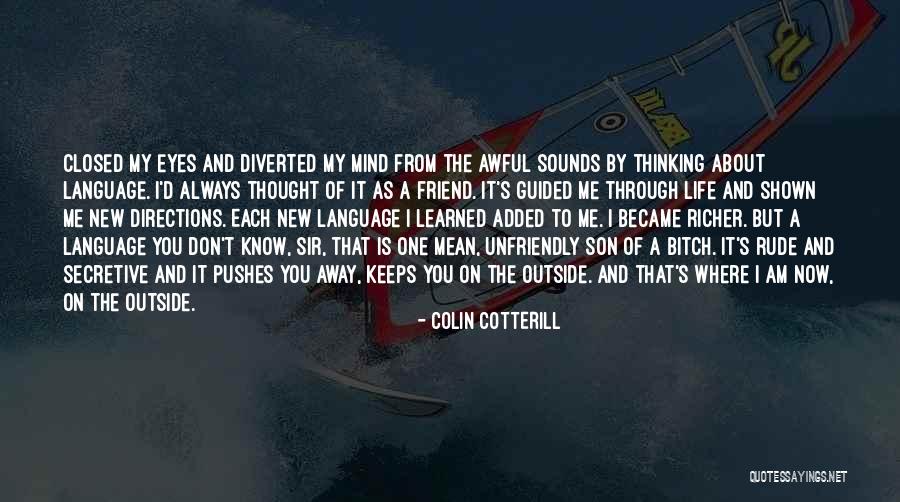
Closed my eyes and diverted my mind from the awful sounds by thinking about language. I'd always thought of it as a friend. It's guided me through life and shown me new directions. Each new language I learned added to me. I became richer. But a language you don't know, sir, that is one mean, unfriendly son of a bitch. It's rude and secretive and it pushes you away, keeps you on the outside. And that's where I am now, on the outside. — Colin Cotterill
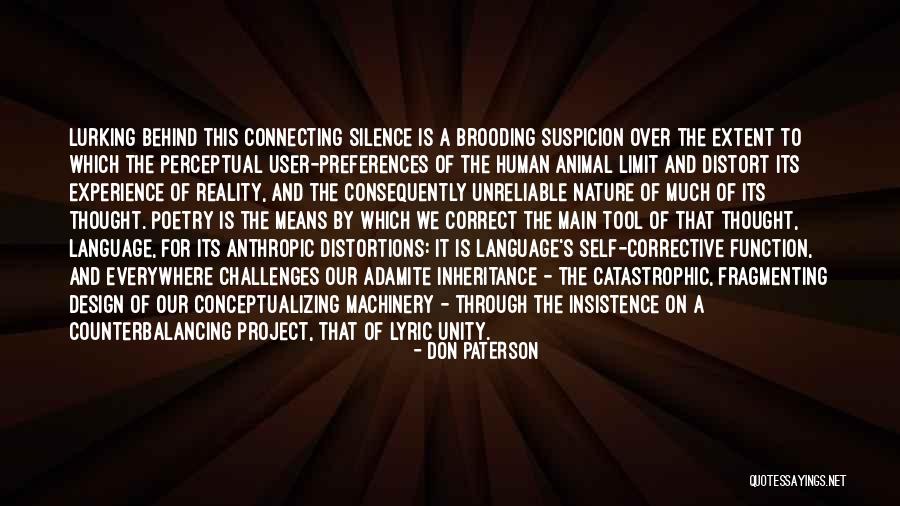
Lurking behind this connecting silence is a brooding suspicion over the extent to which the perceptual user-preferences of the human animal limit and distort its experience of reality, and the consequently unreliable nature of much of its thought. Poetry is the means by which we correct the main tool of that thought, language, for its anthropic distortions: it is language's self-corrective function, and everywhere challenges our Adamite inheritance - the catastrophic, fragmenting design of our conceptualizing machinery - through the insistence on a counterbalancing project, that of lyric unity. — Don Paterson

I considered quitting graduate school. I paid my ticket, I rode the ride. Right? Half the people I started with quit. I did not have to continue toward scholar. But something wouldn't let me. Some deep wrestling match going on inside my rib house and gray matter. Some woman in me I'd never met. You know who she was? My intellect. When I opened the door and there she stood, with her sassy red reading glasses and fitted skirt and leather bookbag, I thought, who the hell are you? Crouching into a defensive posture and looking at her warily out of the corner of my eye. Watch out, woman. To which she replied, I'm Lidia. I have a desire toward language and knowledge that will blow your mind. — Lidia Yuknavitch
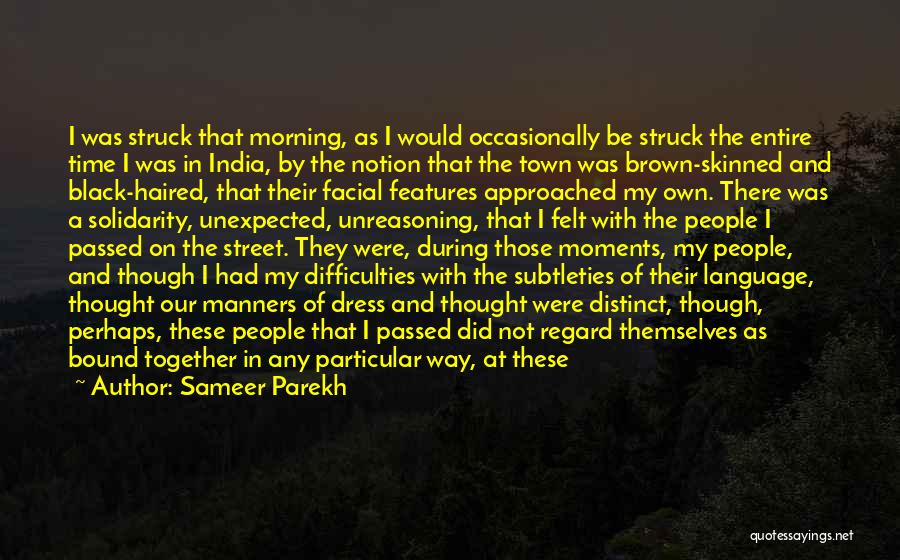
I was struck that morning, as I would occasionally be struck the entire time I was in India, by the notion that the town was brown-skinned and black-haired, that their facial features approached my own. There was a solidarity, unexpected, unreasoning, that I felt with the people I passed on the street. They were, during those moments, my people, and though I had my difficulties with the subtleties of their language, thought our manners of dress and thought were distinct, though, perhaps, these people that I passed did not regard themselves as bound together in any particular way, at these instants I would disregard such nuance and imagine a profound relationship between us. Later, during stretches more lucid, I'd marvel at this rush of emotion and wonder as to its source. — Sameer Parekh
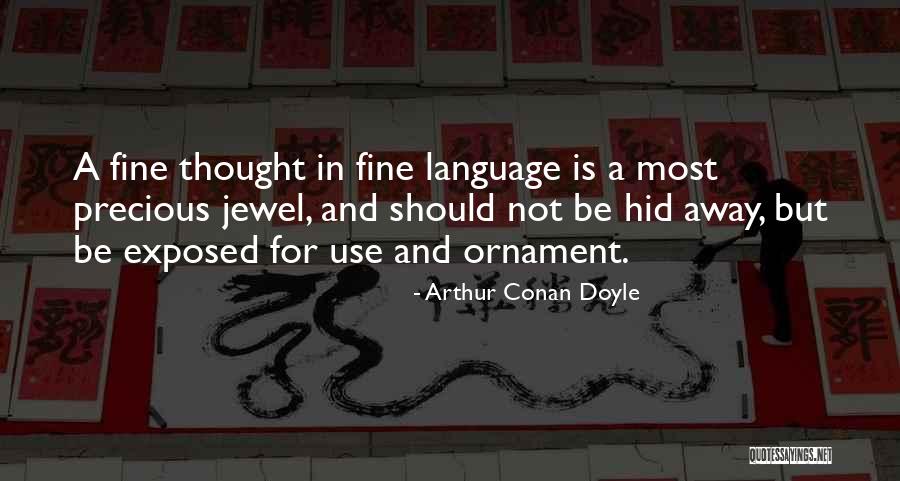
A fine thought in fine language is a most precious jewel, and should not be hid away, but be exposed for use and ornament. — Arthur Conan Doyle
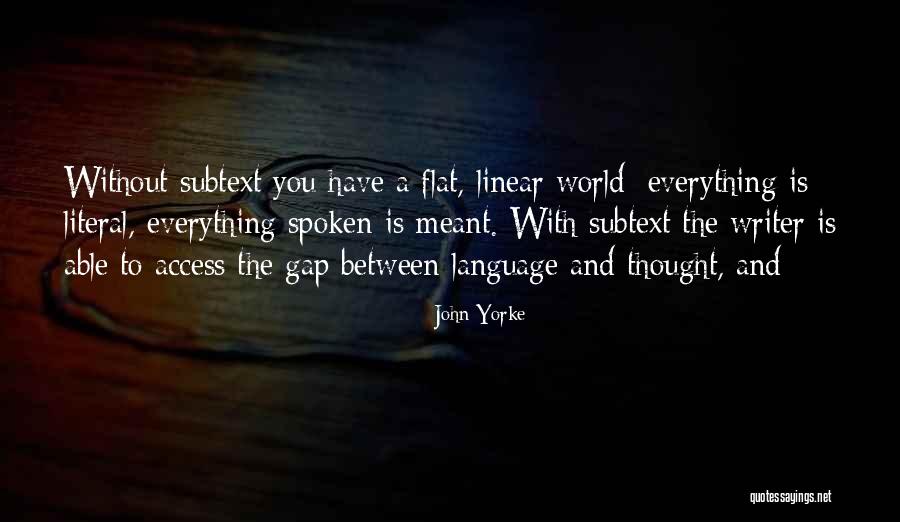
Without subtext you have a flat, linear world; everything is literal, everything spoken is meant. With subtext the writer is able to access the gap between language and thought, and — John Yorke
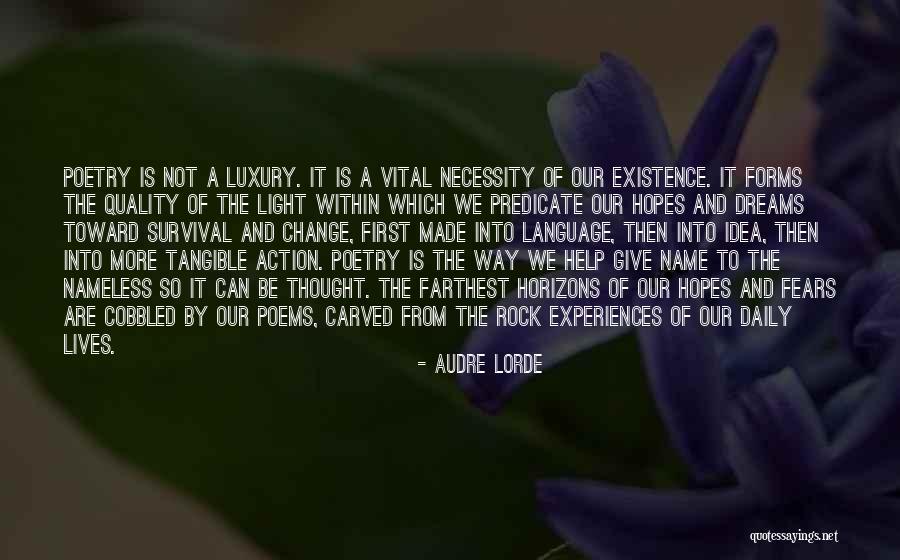
Poetry is not a luxury. It is a vital necessity of our existence. It forms the quality of the light within which we predicate our hopes and dreams toward survival and change, first made into language, then into idea, then into more tangible action. Poetry is the way we help give name to the nameless so it can be thought. The farthest horizons of our hopes and fears are cobbled by our poems, carved from the rock experiences of our daily lives. — Audre Lorde
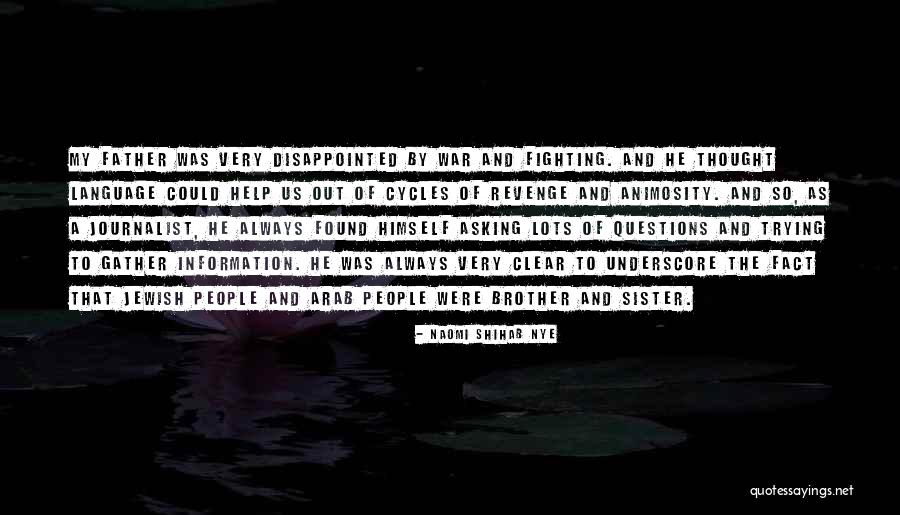
My father was very disappointed by war and fighting. And he thought language could help us out of cycles of revenge and animosity. And so, as a journalist, he always found himself asking lots of questions and trying to gather information. He was always very clear to underscore the fact that Jewish people and Arab people were brother and sister. — Naomi Shihab Nye
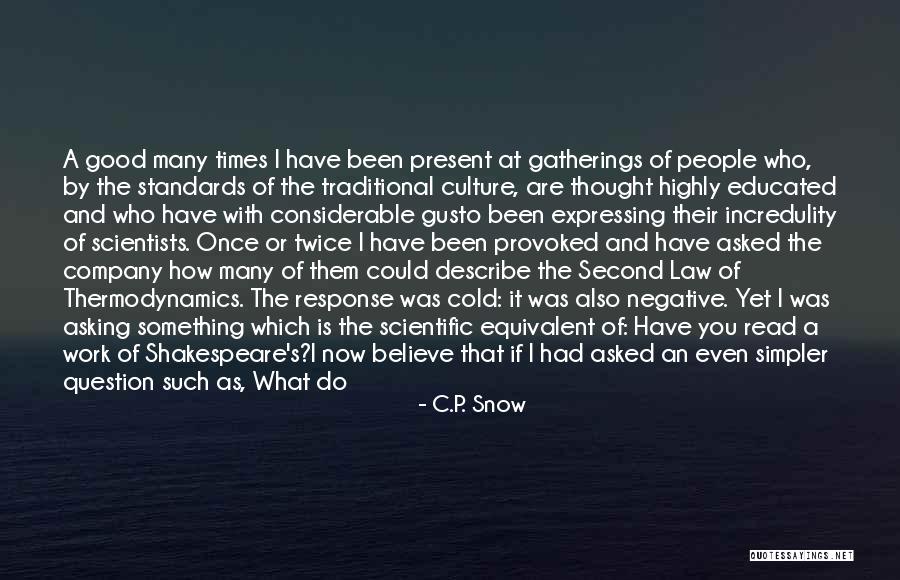
A good many times I have been present at gatherings of people who, by the standards of the traditional culture, are thought highly educated and who have with considerable gusto been expressing their incredulity of scientists. Once or twice I have been provoked and have asked the company how many of them could describe the Second Law of Thermodynamics. The response was cold: it was also negative. Yet I was asking something which is the scientific equivalent of: Have you read a work of Shakespeare's?
I now believe that if I had asked an even simpler question
such as, What do you mean by mass, or acceleration, which is the scientific equivalent of saying, Can you read?
not more than one in ten of the highly educated would have felt that I was speaking the same language. So the great edifice of modern physics goes up, and the majority of the cleverest people in the western world have about as much insight into it as their neolithic ancestors would have had. — C.P. Snow
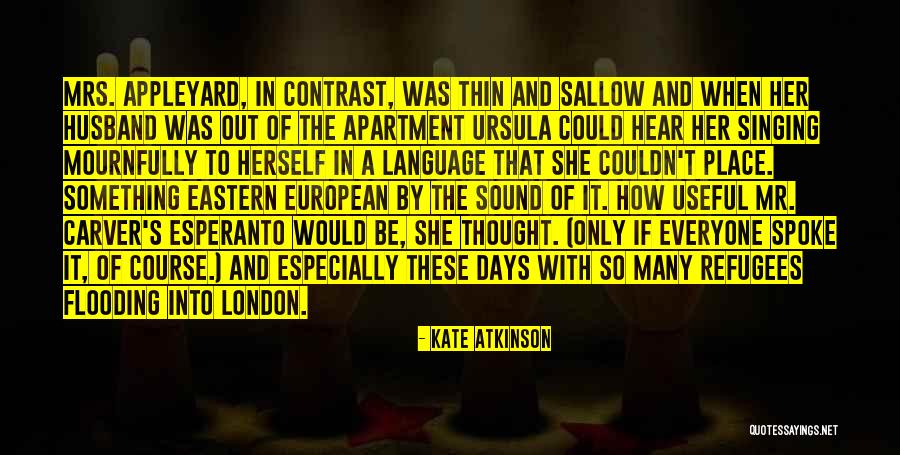
Mrs. Appleyard, in contrast, was thin and sallow and when her husband was out of the apartment Ursula could hear her singing mournfully to herself in a language that she couldn't place. Something Eastern European by the sound of it. How useful Mr. Carver's Esperanto would be, she thought. (Only if everyone spoke it, of course.) And especially these days with so many refugees flooding into London. — Kate Atkinson
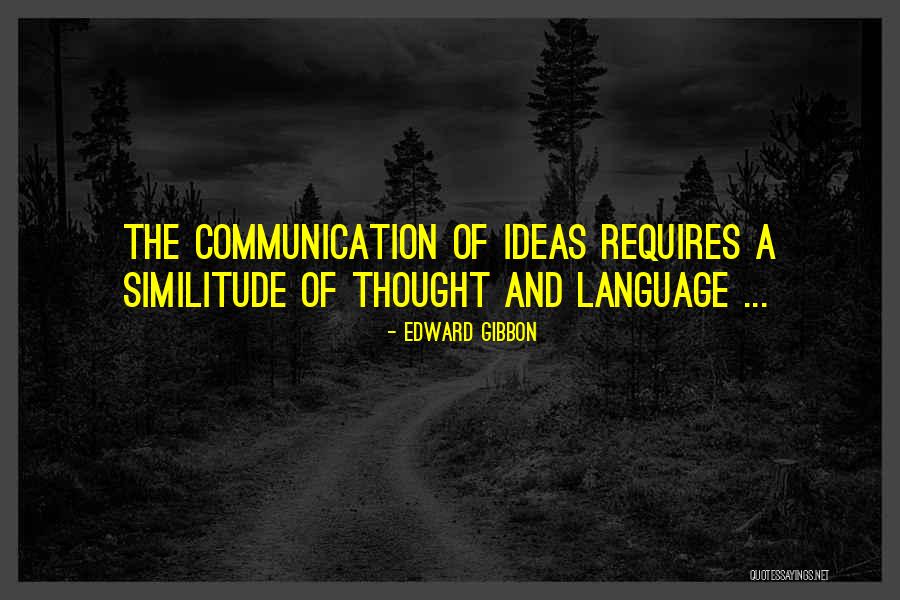
The communication of ideas requires a similitude of thought and language ... — Edward Gibbon
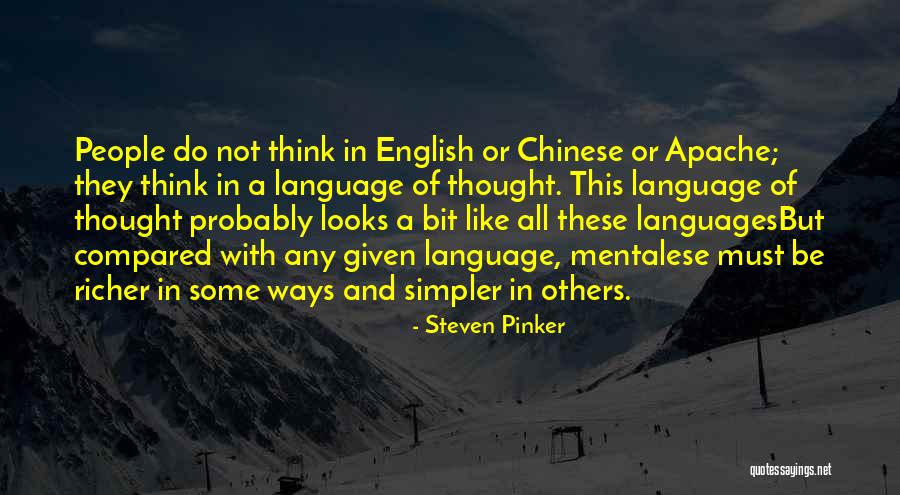
People do not think in English or Chinese or Apache; they think in a language of thought. This language of thought probably looks a bit like all these languagesBut compared with any given language, mentalese must be richer in some ways and simpler in others. — Steven Pinker
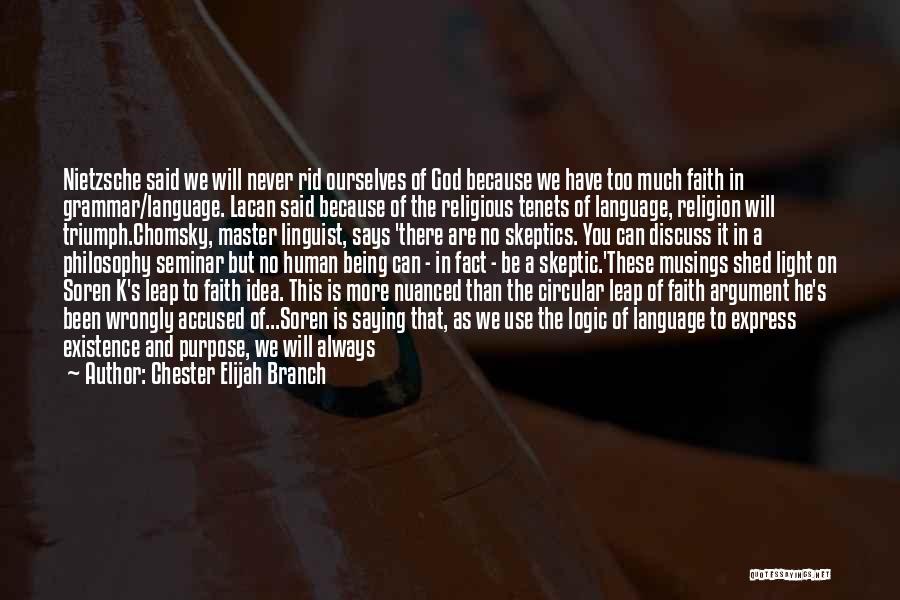
Nietzsche said we will never rid ourselves of God because we have too much faith in grammar/language.
Lacan said because of the religious tenets of language, religion will triumph.
Chomsky, master linguist, says 'there are no skeptics. You can discuss it in a philosophy seminar but no human being can - in fact - be a skeptic.'
These musings shed light on Soren K's leap to faith idea. This is more nuanced than the circular leap of faith argument he's been wrongly accused of...
Soren is saying that, as we use the logic of language to express existence and purpose, we will always leap TO faith in a superior, all encompassing, loving force that guides our lives.
This faith does not negate our reason. It simply implies that the reasoning of this superior force is superior to our own. Edwin Abbott crystalizes this in Flatland. — Chester Elijah Branch
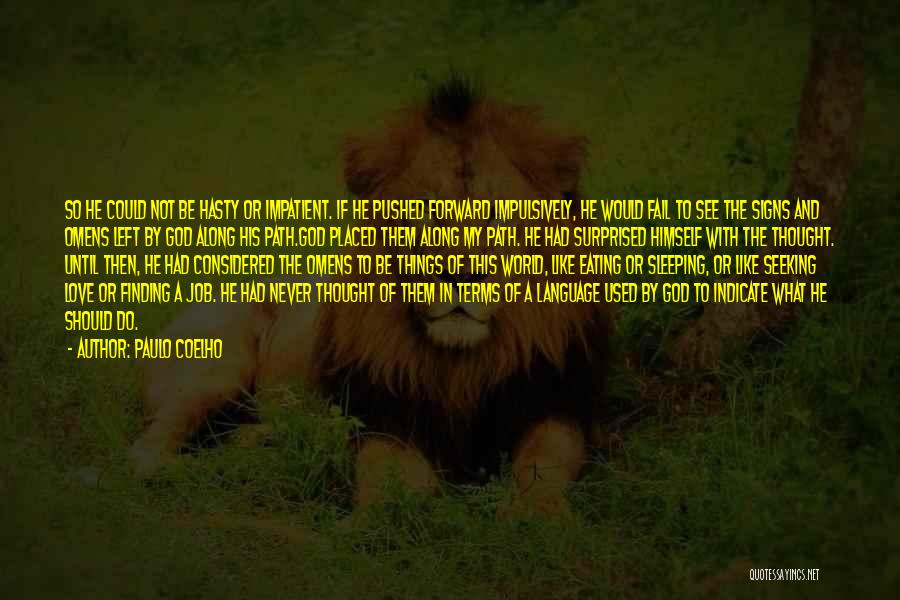
So he could not be hasty or impatient. If he pushed forward impulsively, he would fail to see the signs and omens left by God along his path.
God placed them along my path. He had surprised himself with the thought. Until then, he had considered the omens to be things of this world, Like eating or sleeping, or like seeking love or finding a job. he had never thought of them in terms of a language used by God to indicate what he should do. — Paulo Coelho
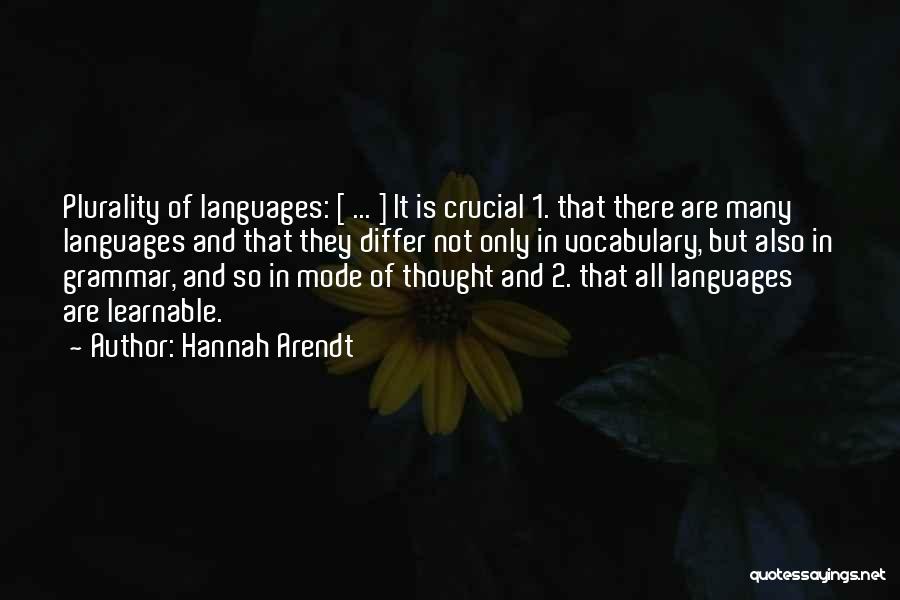
Plurality of languages: [ ... ] It is crucial 1. that there are many languages and that they differ not only in vocabulary, but also in grammar, and so in mode of thought and 2. that all languages are learnable. — Hannah Arendt
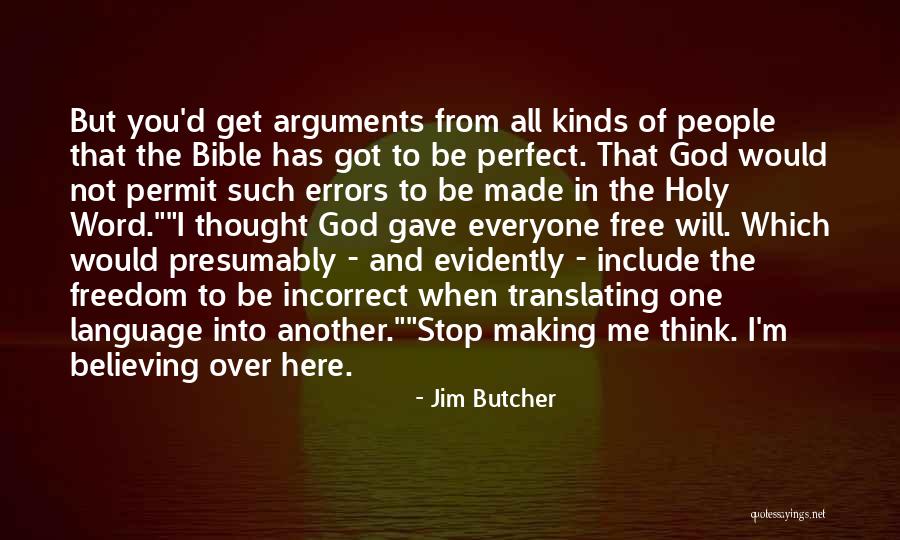
But you'd get arguments from all kinds of people that the Bible has got to be perfect. That God would not permit such errors to be made in the Holy Word."
"I thought God gave everyone free will. Which would presumably - and evidently - include the freedom to be incorrect when translating one language into another."
"Stop making me think. I'm believing over here. — Jim Butcher

Asked nicely, and that didn't seem to work. So I thought you'd be useful. Your language is more uncivilized than mine. — Krista Ritchie
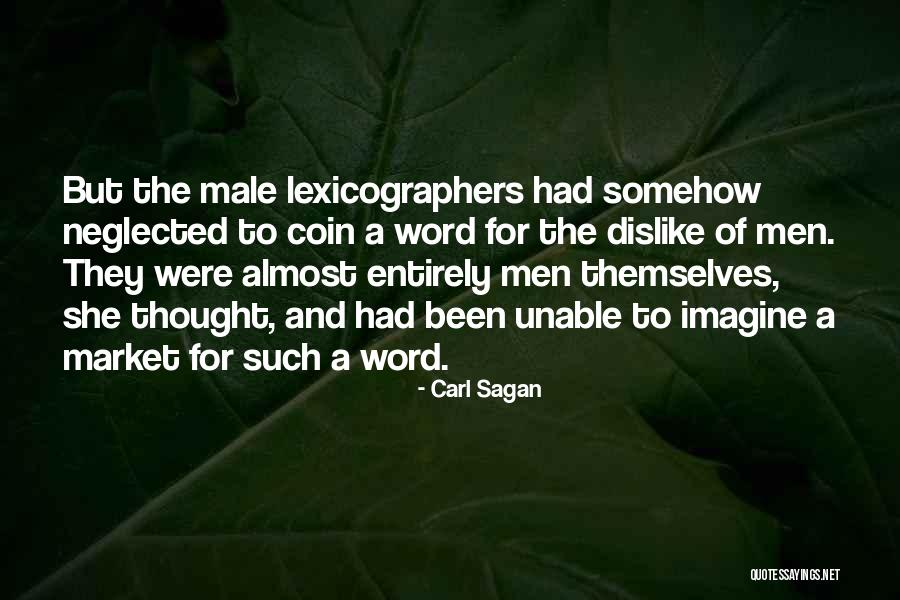
But the male lexicographers had somehow neglected to coin a word for the dislike of men. They were almost entirely men themselves, she thought, and had been unable to imagine a market for such a word. — Carl Sagan
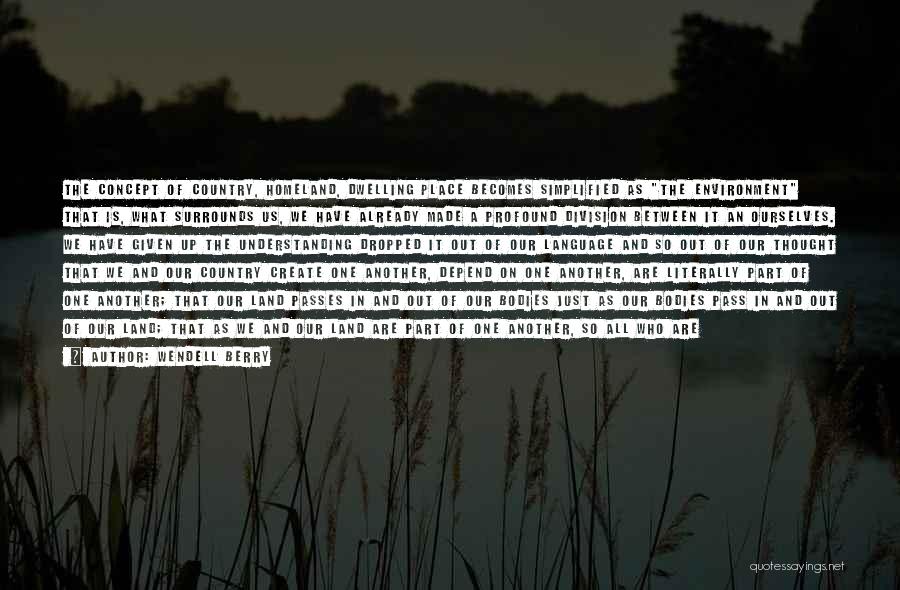
The concept of country, homeland, dwelling place becomes simplified as "the environment"
that is, what surrounds us, we have already made a profound division between it an ourselves. We have given up the understanding
dropped it out of our language and so out of our thought
that we and our country create one another, depend on one another, are literally part of one another; that our land passes in and out of our bodies just as our bodies pass in and out of our land; that as we and our land are part of one another, so all who are living as neighbors here, human and plant and animal, are part of one another, and so cannot possibly flourish alone; that, therefore, our culture must be our response to our place, our culture and our place are images of each other and inseparable from each other, and so neither can be better than they other. — Wendell Berry
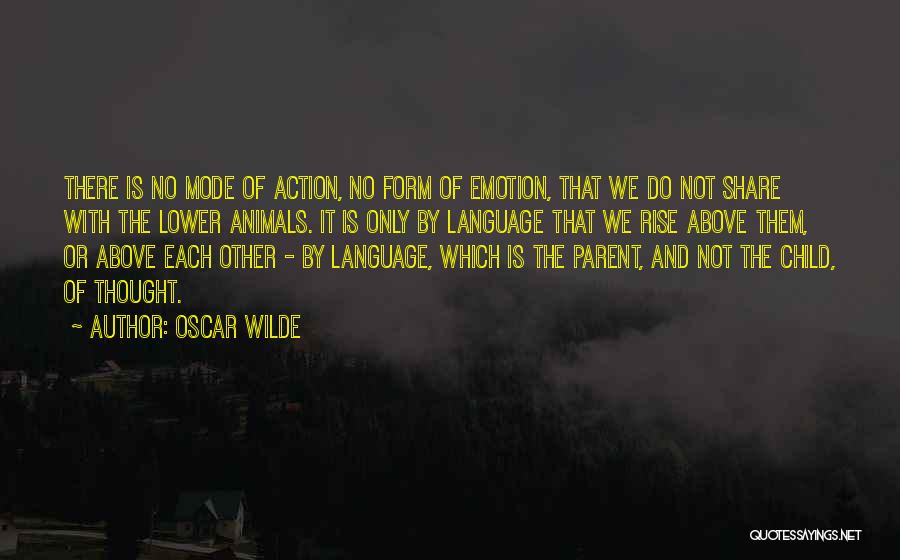
There is no mode of action, no form of emotion, that we do not share with the lower animals. It is only by language that we rise above them, or above each other - by language, which is the parent, and not the child, of thought. — Oscar Wilde
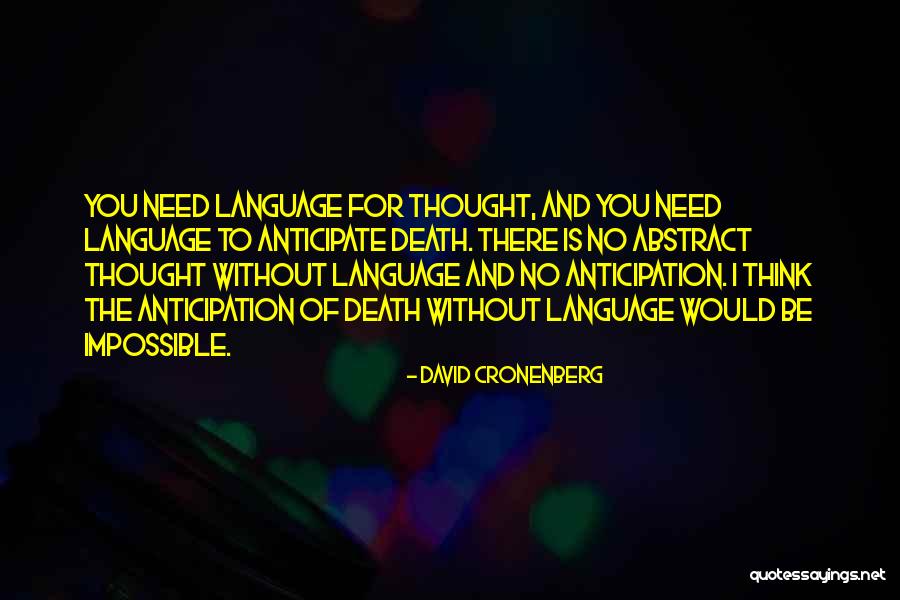
You need language for thought, and you need language to anticipate death. There is no abstract thought without language and no anticipation. I think the anticipation of death without language would be impossible. — David Cronenberg
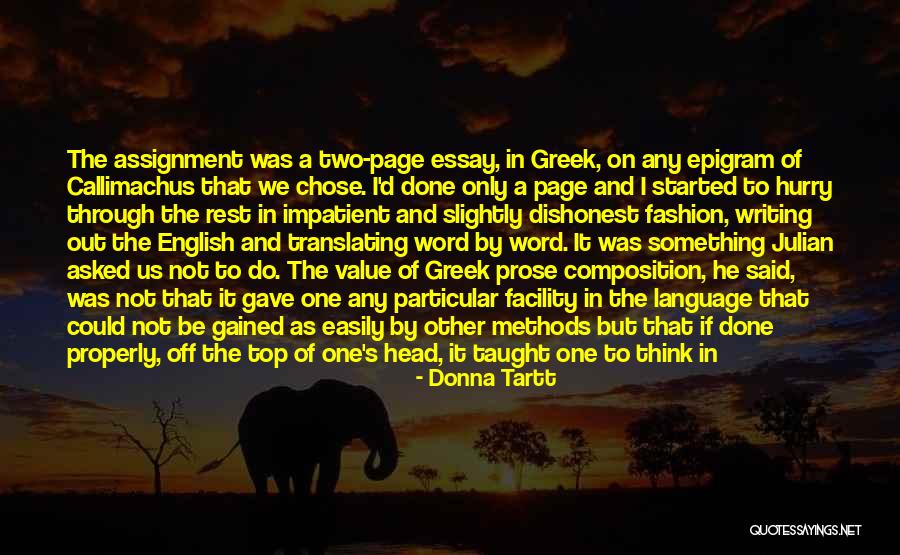
The assignment was a two-page essay, in Greek, on any epigram of Callimachus that we chose. I'd done only a page and I started to hurry through the rest in impatient and slightly dishonest fashion, writing out the English and translating word by word. It was something Julian asked us not to do. The value of Greek prose composition, he said, was not that it gave one any particular facility in the language that could not be gained as easily by other methods but that if done properly, off the top of one's head, it taught one to think in Greek. One's thought patterns become different, he said, when forced into the confines of a rigid and unfamiliar tongue. Certain common ideas become inexpressible; other, previously undreamt-of ones spring to life, finding miraculous new articulation. — Donna Tartt
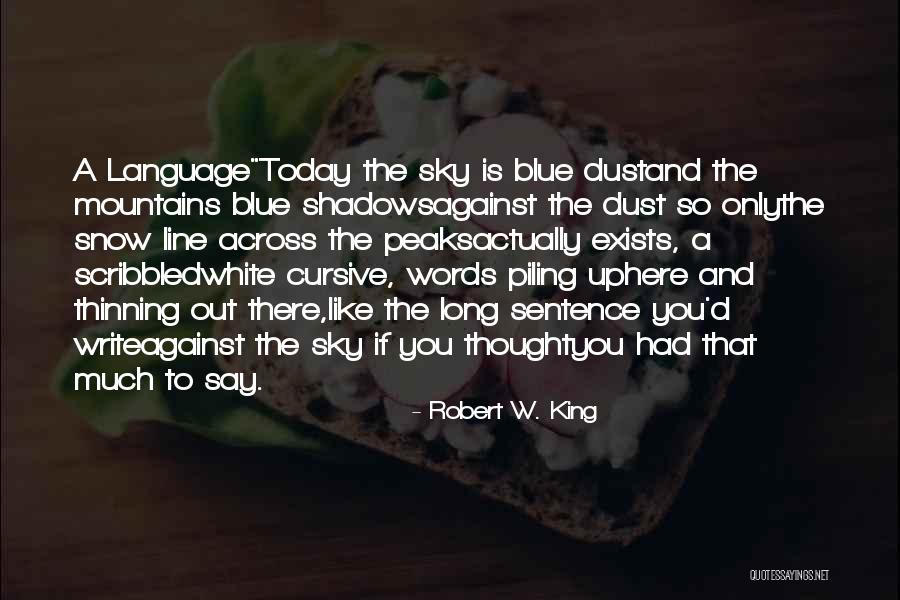
A Language"
Today the sky is blue dust
and the mountains blue shadows
against the dust so only
the snow line across the peaks
actually exists, a scribbled
white cursive, words piling up
here and thinning out there,
like the long sentence you'd write
against the sky if you thought
you had that much to say. — Robert W. King
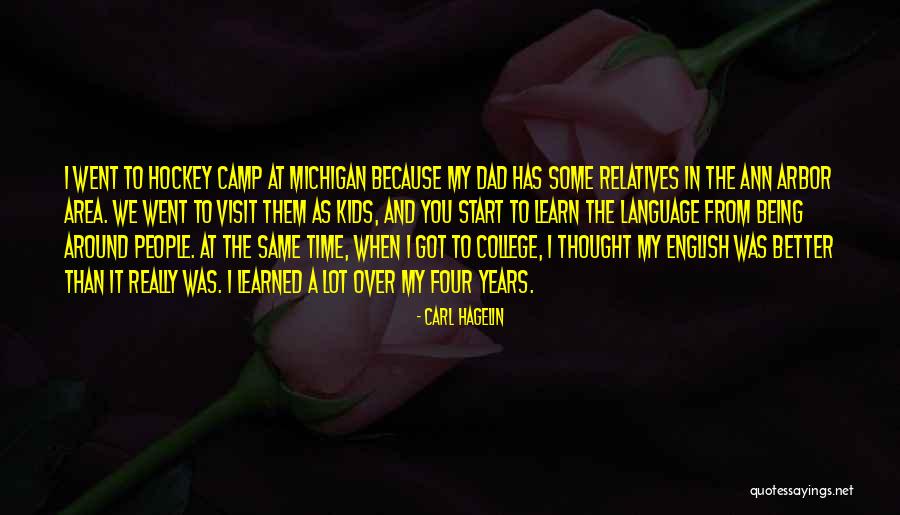
I went to hockey camp at Michigan because my dad has some relatives in the Ann Arbor area. We went to visit them as kids, and you start to learn the language from being around people. At the same time, when I got to college, I thought my English was better than it really was. I learned a lot over my four years. — Carl Hagelin
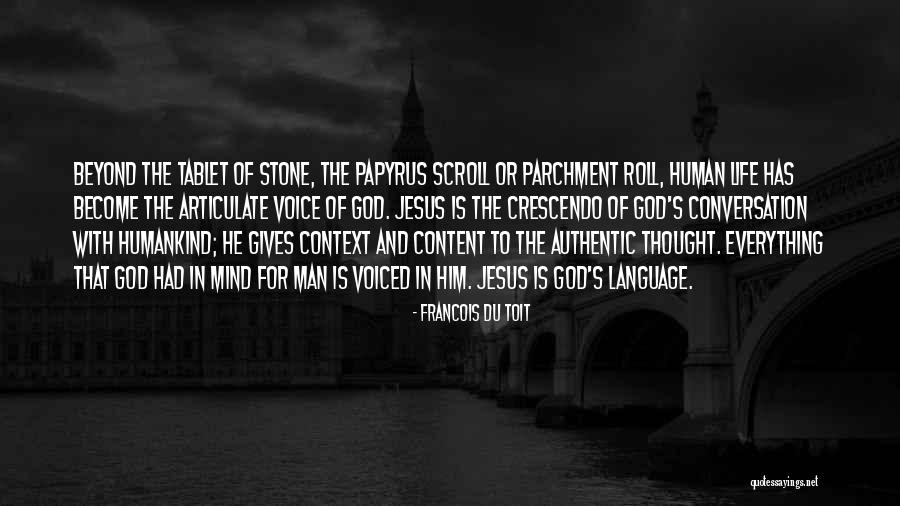
Beyond the tablet of stone, the papyrus scroll or parchment roll, human life has become the articulate voice of God. Jesus is the crescendo of God's conversation with humankind; he gives context and content to the authentic thought. Everything that God had in mind for man is voiced in him. Jesus is God's language. — Francois Du Toit
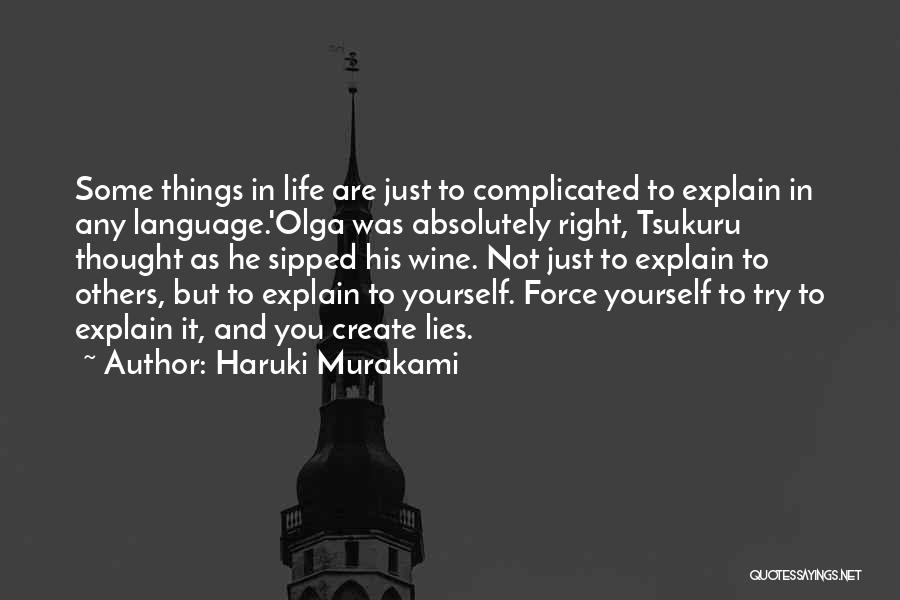
Some things in life are just to complicated to explain in any language.'
Olga was absolutely right, Tsukuru thought as he sipped his wine. Not just to explain to others, but to explain to yourself. Force yourself to try to explain it, and you create lies. — Haruki Murakami
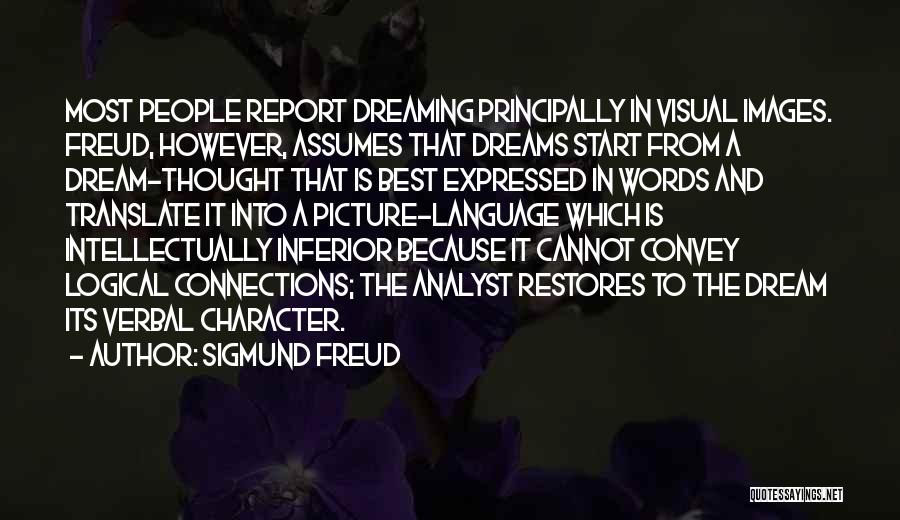
Most people report dreaming principally in visual images. Freud, however, assumes that dreams start from a dream-thought that is best expressed in words and translate it into a picture-language which is intellectually inferior because it cannot convey logical connections; the analyst restores to the dream its verbal character. — Sigmund Freud
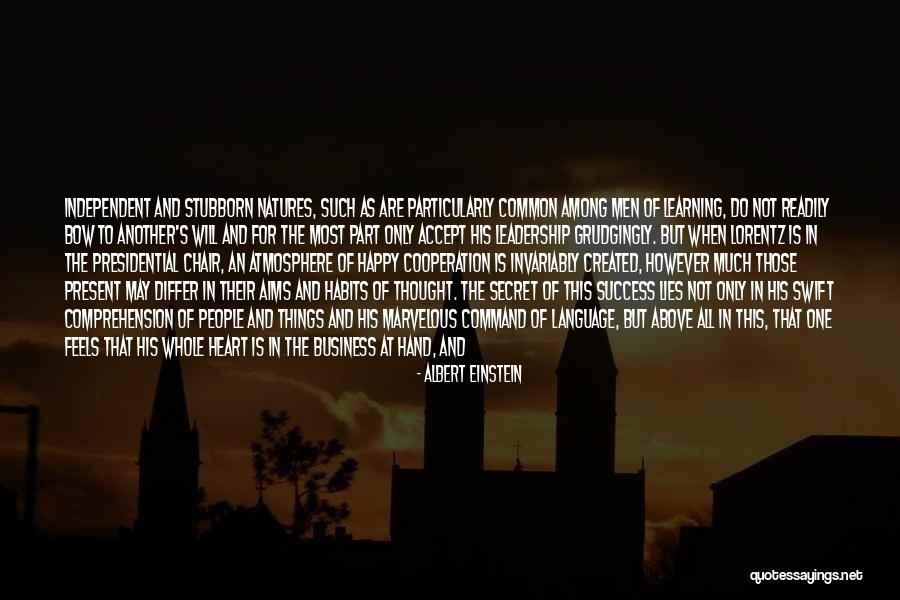
Independent and stubborn natures, such as are particularly common among men of learning, do not readily bow to another's will and for the most part only accept his leadership grudgingly. But when Lorentz is in the presidential chair, an atmosphere of happy cooperation is invariably created, however much those present may differ in their aims and habits of thought. The secret of this success lies not only in his swift comprehension of people and things and his marvelous command of language, but above all in this, that one feels that his whole heart is in the business at hand, and that when he is at work, he has room for nothing else in his mind. Nothing disarms the recalcitrant so much as this. — Albert Einstein
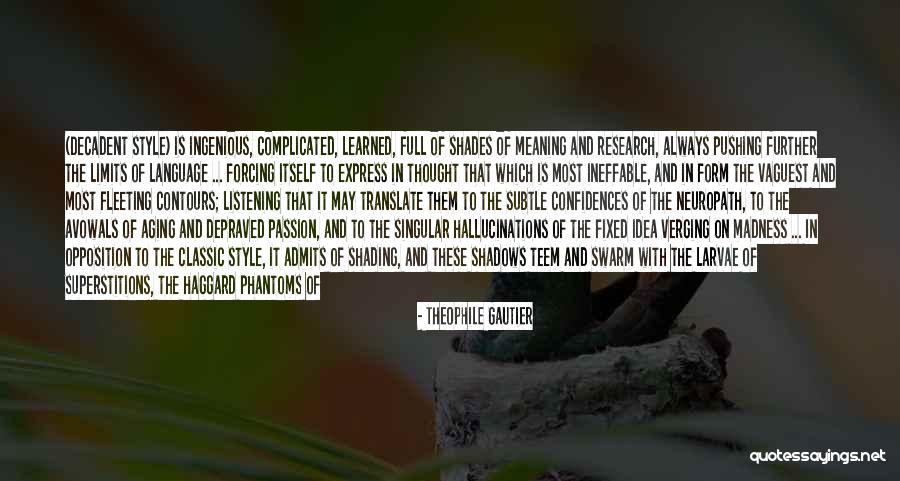
(Decadent style) is ingenious, complicated, learned, full of shades of meaning and research, always pushing further the limits of language ... forcing itself to express in thought that which is most ineffable, and in form the vaguest and most fleeting contours; listening that it may translate them to the subtle confidences of the neuropath, to the avowals of aging and depraved passion, and to the singular hallucinations of the fixed idea verging on madness ... In opposition to the classic style, it admits of shading, and these shadows teem and swarm with the larvae of superstitions, the haggard phantoms of insomnia, nocturnal terrors, remorse which starts and turns back at the slightest noise, monstrous dreams stayed only by impotence, obscure phantasies at which daylight would stand amazed, and all that the soul conceals of the dark, the unformed, and the vaguely horrible, in its deepest and furthest recesses. — Theophile Gautier
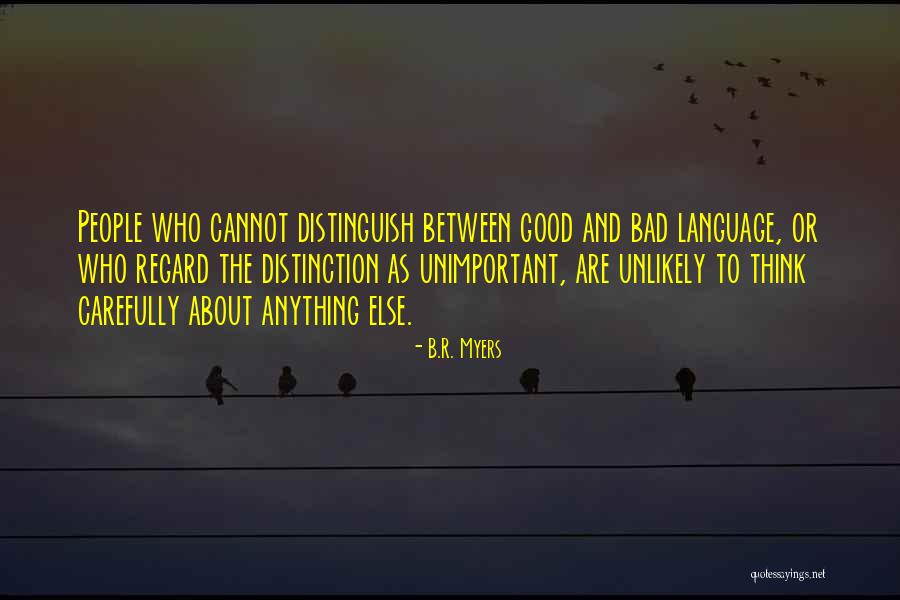
People who cannot distinguish between good and bad language, or who regard the distinction as unimportant, are unlikely to think carefully about anything else. — B.R. Myers
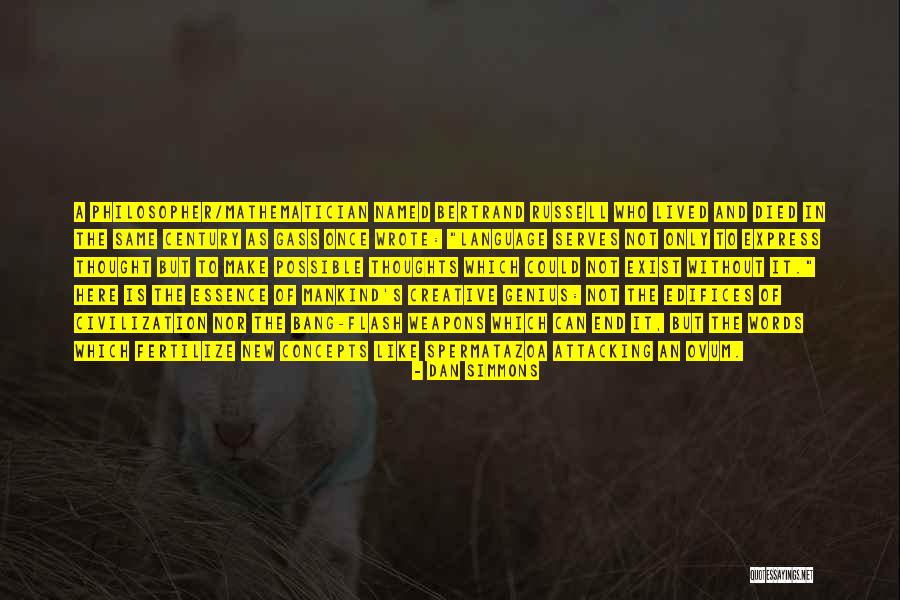
A philosopher/mathematician named Bertrand Russell who lived and died in the same century as Gass once wrote: "Language serves not only to express thought but to make possible thoughts which could not exist without it." Here is the essence of mankind's creative genius: not the edifices of civilization nor the bang-flash weapons which can end it, but the words which fertilize new concepts like spermatazoa attacking an ovum. — Dan Simmons

It seems to me that the binary opposition that is so much embedded in Western thought and language makes it nearly impossible to project a complex response. — Bell Hooks
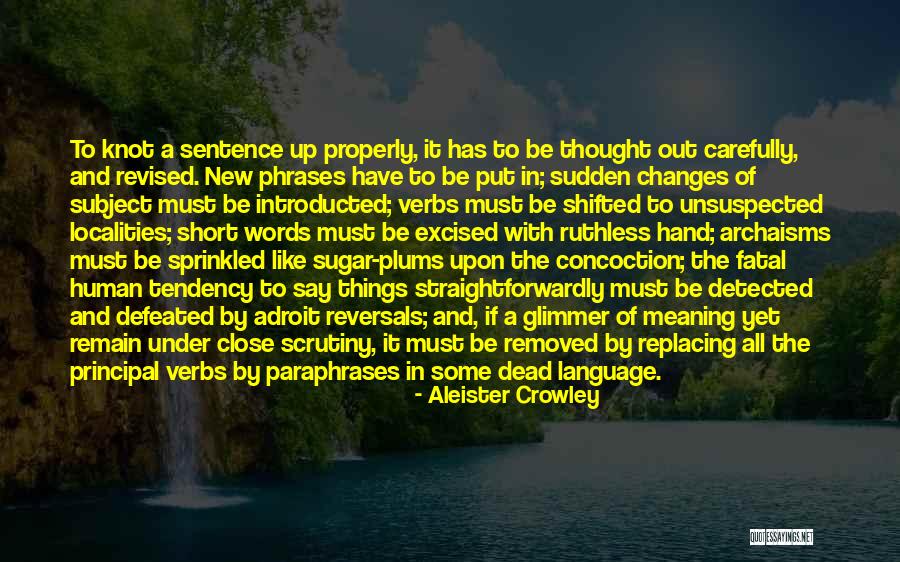
To knot a sentence up properly, it has to be thought out carefully, and revised. New phrases have to be put in; sudden changes of subject must be introducted; verbs must be shifted to unsuspected localities; short words must be excised with ruthless hand; archaisms must be sprinkled like sugar-plums upon the concoction; the fatal human tendency to say things straightforwardly must be detected and defeated by adroit reversals; and, if a glimmer of meaning yet remain under close scrutiny, it must be removed by replacing all the principal verbs by paraphrases in some dead language. — Aleister Crowley
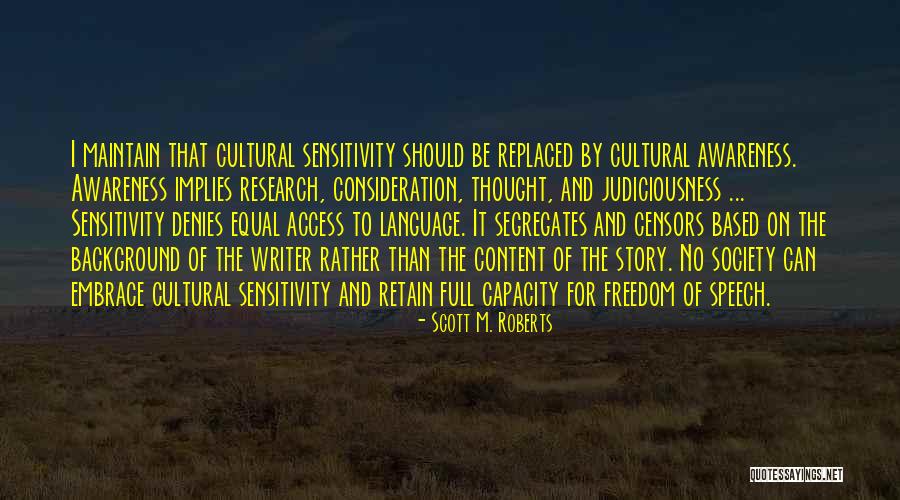
I maintain that cultural sensitivity should be replaced by cultural awareness. Awareness implies research, consideration, thought, and judiciousness ...
Sensitivity denies equal access to language. It segregates and censors based on the background of the writer rather than the content of the story. No society can embrace cultural sensitivity and retain full capacity for freedom of speech. — Scott M. Roberts
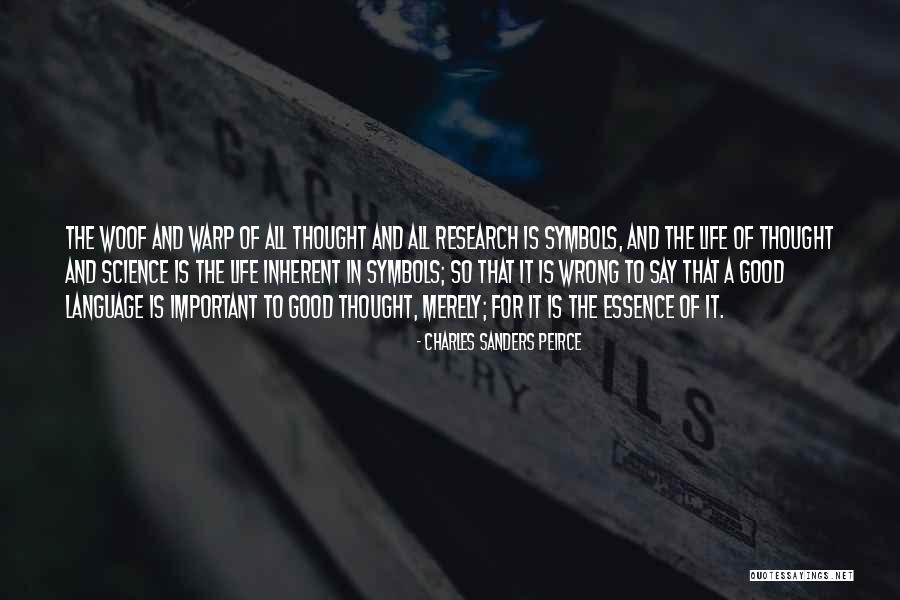
The woof and warp of all thought and all research is symbols, and the life of thought and science is the life inherent in symbols; so that it is wrong to say that a good language is important to good thought, merely; for it is the essence of it. — Charles Sanders Peirce
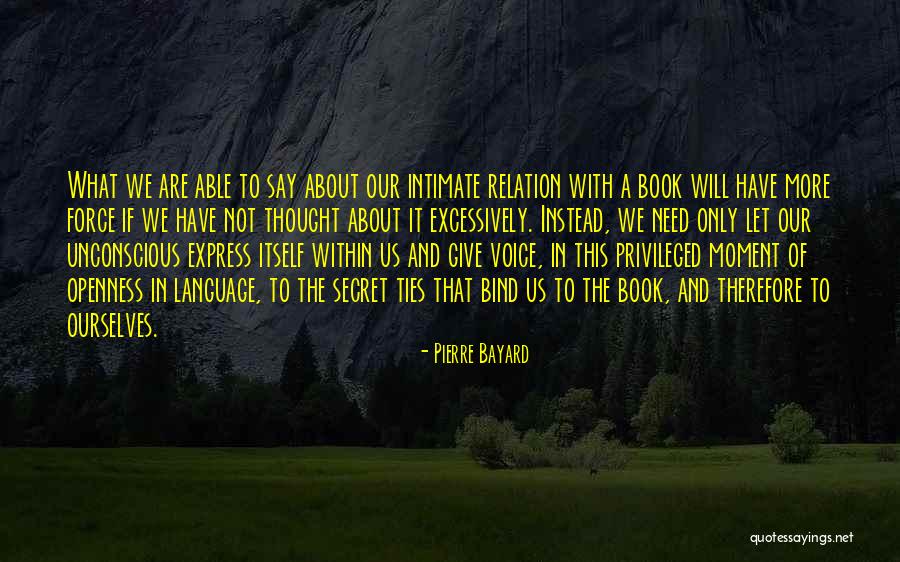
What we are able to say about our intimate relation with a book will have more force if we have not thought about it excessively. Instead, we need only let our unconscious express itself within us and give voice, in this privileged moment of openness in language, to the secret ties that bind us to the book, and therefore to ourselves. — Pierre Bayard
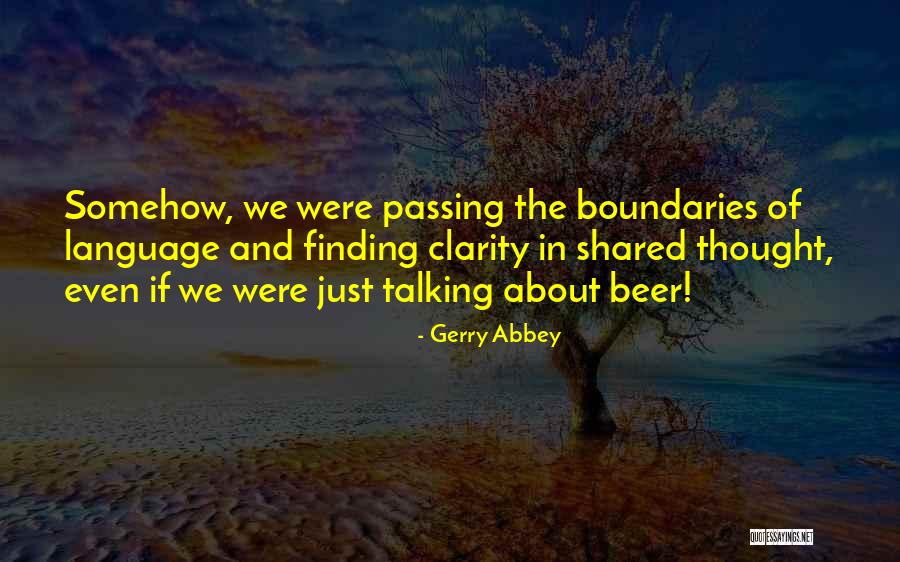
Somehow, we were passing the boundaries of language and finding clarity in shared thought, even if we were just talking about beer! — Gerry Abbey
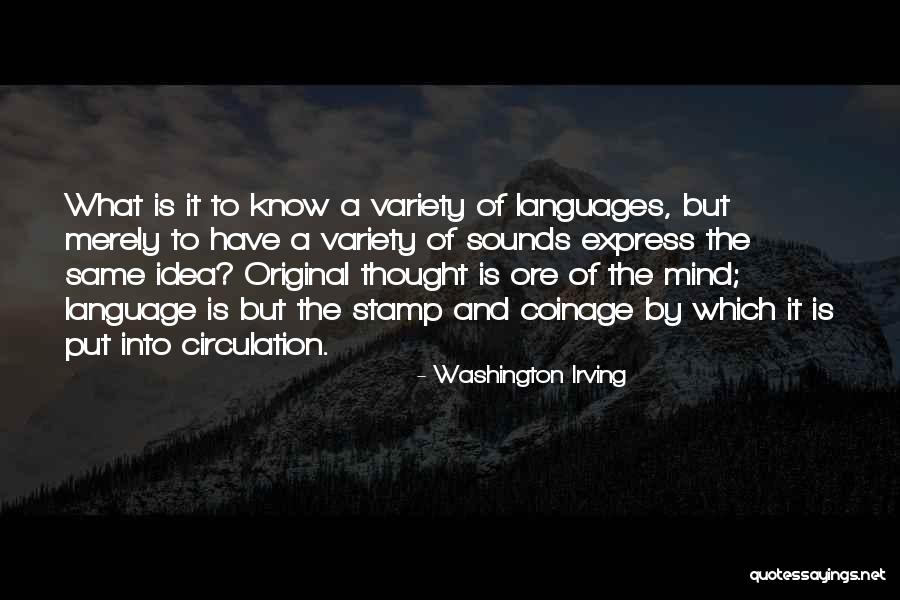
What is it to know a variety of languages, but merely to have a variety of sounds express the same idea? Original thought is ore of the mind; language is but the stamp and coinage by which it is put into circulation. — Washington Irving
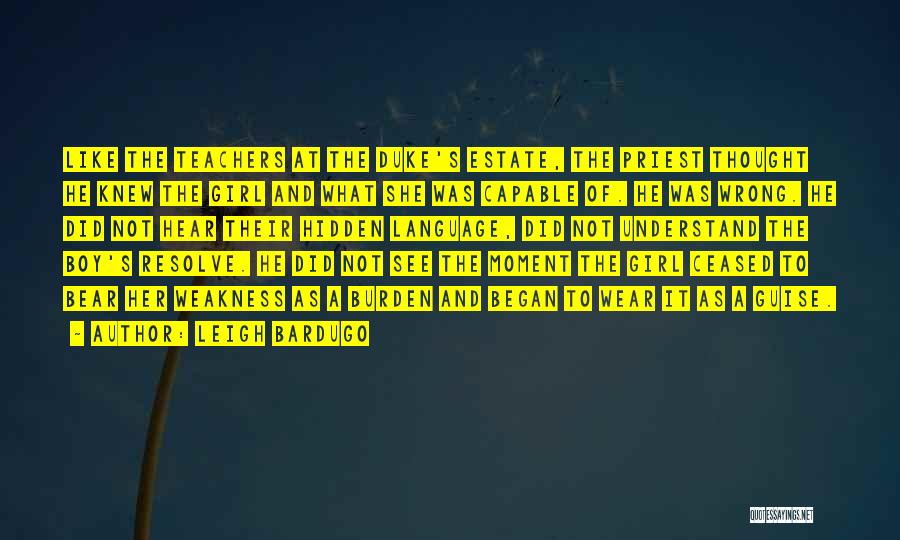
Like the teachers at the Duke's estate, the priest thought he knew the girl and what she was capable of. He was wrong. He did not hear their hidden language, did not understand the boy's resolve. He did not see the moment the girl ceased to bear her weakness as a burden and began to wear it as a guise. — Leigh Bardugo
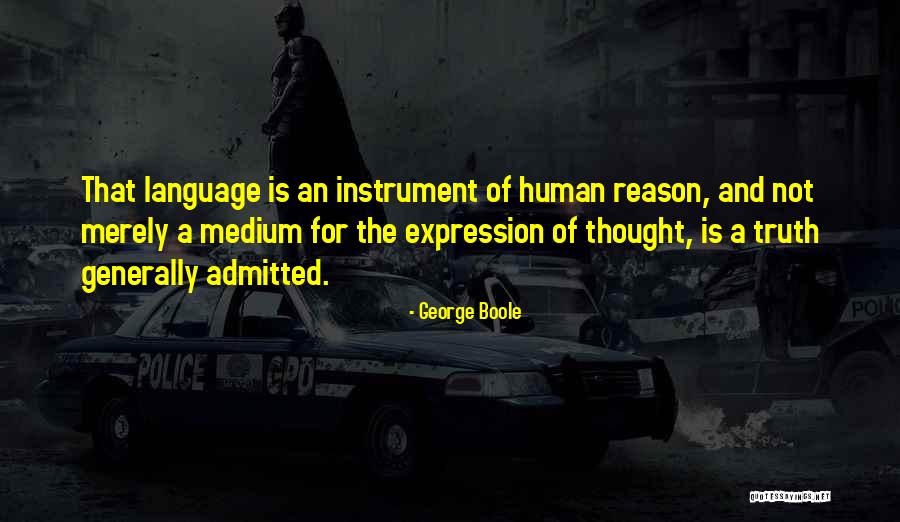
That language is an instrument of human reason, and not merely a medium for the expression of thought, is a truth generally admitted. — George Boole
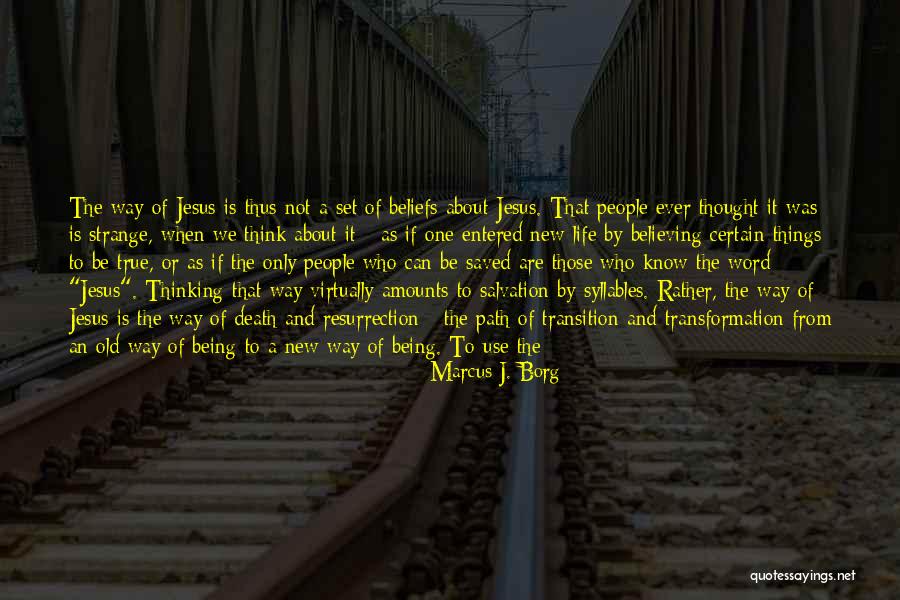
The way of Jesus is thus not a set of beliefs about Jesus. That people ever thought it was is strange, when we think about it - as if one entered new life by believing certain things to be true, or as if the only people who can be saved are those who know the word "Jesus". Thinking that way virtually amounts to salvation by syllables.
Rather, the way of Jesus is the way of death and resurrection - the path of transition and transformation from an old way of being to a new way of being. To use the language of incarnation that is so central to John, Jesus incarnates the way. Incarnation means embodiment. Jesus is what the way embodied in a human life looks like. — Marcus J. Borg
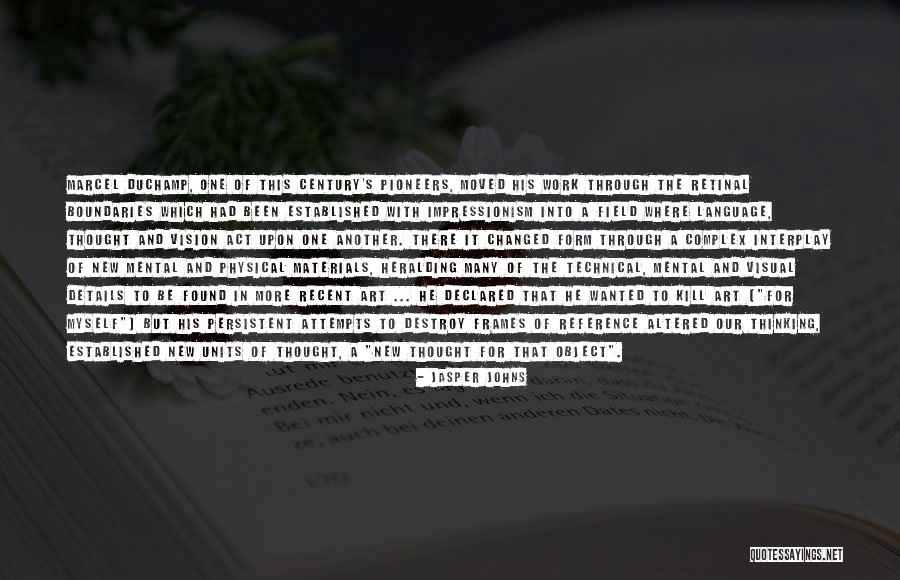
Marcel Duchamp, one of this century's pioneers, moved his work through the retinal boundaries which had been established with Impressionism into a field where language, thought and vision act upon one another. There it changed form through a complex interplay of new mental and physical materials, heralding many of the technical, mental and visual details to be found in more recent art ... He declared that he wanted to kill art ("for myself") but his persistent attempts to destroy frames of reference altered our thinking, established new units of thought, a "new thought for that object". — Jasper Johns

The bad preacher takes the ideas of our own age and tricks them out into the traditional language of Christianity. The core of his thought is merely contemporary; only the superficies is traditional. But your teaching must be timeless at its heart and wear modern dress. — C.S. Lewis
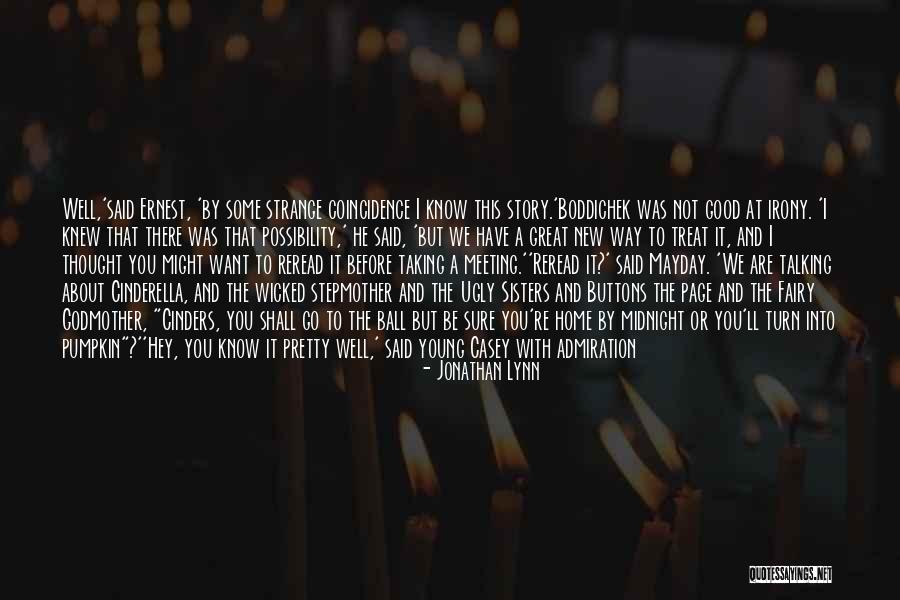
Well,'said Ernest, 'by some strange coincidence I know this story.'
Boddichek was not good at irony. 'I knew that there was that possibility,' he said, 'but we have a great new way to treat it, and I thought you might want to reread it before taking a meeting.'
'Reread it?' said Mayday. 'We are talking about Cinderella, and the wicked stepmother and the Ugly Sisters and Buttons the page and the Fairy Godmother, "Cinders, you shall go to the ball but be sure you're home by midnight or you'll turn into pumpkin"?'
'Hey, you know it pretty well,' said young Casey with admiration in his voice. 'But I've found a new directionality for this story.'
'Do you mean direction?' asked Mayday.
'I guess I do.'
'Then', snapped Mayday, 'why don't you fucking say so? — Jonathan Lynn

With you, thought Rubashov and looked at the whitewashed wall behind which the other stood - in the meantime he had
probably lit a cigarette and was blowing the smoke against the wall - with you I have no accounts to settle. To you I owe
no fare. Between you and us there is no common currency and no common language. ... Well, what do you want now? — Arthur Koestler
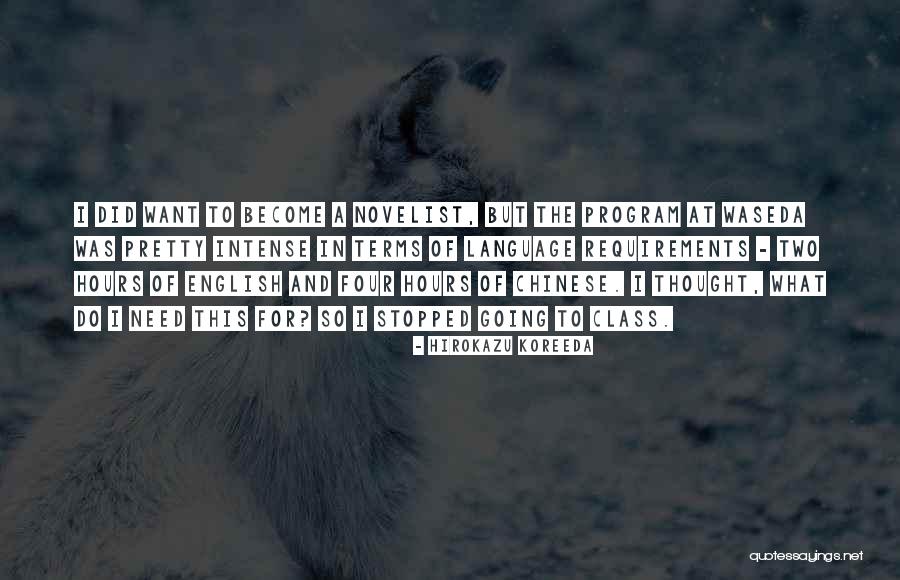
I did want to become a novelist, but the program at Waseda was pretty intense in terms of language requirements - two hours of English and four hours of Chinese. I thought, what do I need this for? So I stopped going to class. — Hirokazu Koreeda
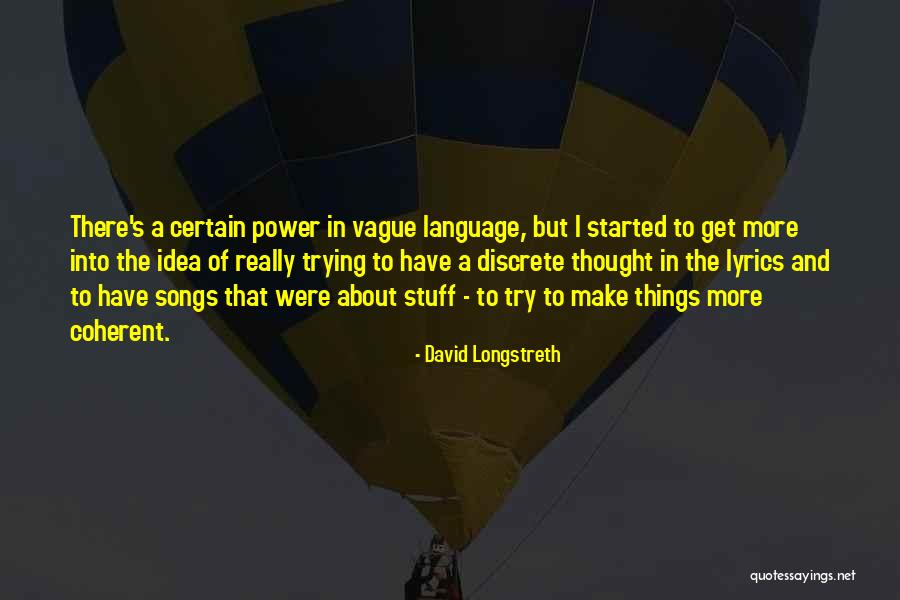
There's a certain power in vague language, but I started to get more into the idea of really trying to have a discrete thought in the lyrics and to have songs that were about stuff - to try to make things more coherent. — David Longstreth
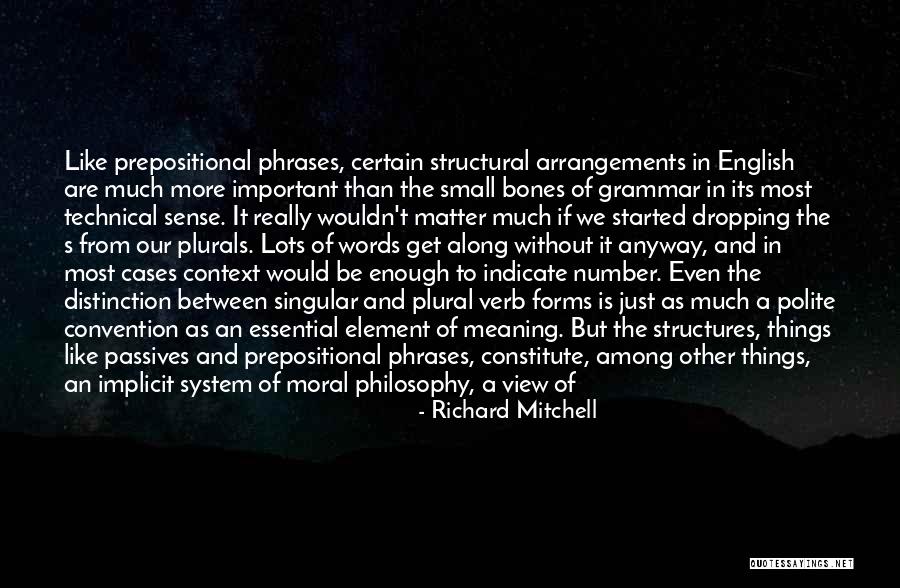
Like prepositional phrases, certain structural arrangements in English are much more important than the small bones of grammar in its most technical sense. It really wouldn't matter much if we started dropping the s from our plurals. Lots of words get along without it anyway, and in most cases context would be enough to indicate number. Even the distinction between singular and plural verb forms is just as much a polite convention as an essential element of meaning. But the structures, things like passives and prepositional phrases, constitute, among other things, an implicit system of moral philosophy, a view of the world and its presumed meanings, and their misuse therefore often betrays an attitude or value that the user might like to disavow.
— Richard Mitchell





